

Can Israeli Citizens Travel to Malaysia?
Malaysia, a vibrant Southeast Asian country known for its diverse culture, stunning landscapes, and mouthwatering cuisine, beckons travelers from around the world. For Israeli citizens considering a journey to this enchanting land, it’s essential to understand the travel regulations and visa requirements. In this blog post, we will explore the question of can Israeli citizens travel to Malaysia, visa considerations, travel tips, and important safety considerations.
Israel and Malaysia currently maintain no formal diplomatic relations. Malaysian passports bear the inscription: “This passport is valid for all countries except Israel”. Israeli passport holders are forbidden to enter Malaysia without written permission from the Malaysian Ministry of Home Affairs. The recognition of Israel is a politically delicate issue for the Malaysian government.
Having said that, while Malaysia officially maintains an outwardly hostile position towards Israel, commercial relations between the two countries do exist.
So the short answer is no, you can’t.
Visiting Malaysia Using Foreign Passport
As an Israeli citizen, you are not allowed to enter Malaysia using your Israeli passport, but in case you hold a foreign one you can use it to visit the beautiful country. In doing so, it is important to follow some recommendations:
First, do not mention at the border that you have an Israeli passport. Also, avoid showing them your Israeli passport by mistake. To ensure a smooth entry, it is best to place it in a separate bag.
Furthermore, refrain from using your Israeli passport to exit the country from which you intend to travel to Malaysia. Malaysian officials may inquire about your previous destination and request to see your exit stamp. As a result, likely, you won’t be able to enter that country using your Israeli passport, although some places (like Hong Kong) may be more lenient in this regard.

Travel Tips To Malaysia
Passport Validity: Ensure your passport is valid for at least six months beyond your intended date of departure from Malaysia.
Cultural Respect: Malaysia is a culturally diverse nation, with a mix of Malay, Chinese, Indian, and indigenous communities. Respect local customs, traditions, and religious practices while visiting various regions.
Local Etiquette: Greet people with a smile and a warm “Salamat” (hello) to make a positive first impression. Understanding local etiquette enhances your travel experience and fosters meaningful interactions with locals.
Try the Cuisine: Don’t miss the opportunity to indulge in Malaysia’s tantalizing cuisine. From flavorful curries to delicious street food, the country offers a feast for the senses.
Safety Considerations
While Malaysia is considered a safe travel destination, it is advisable for all travelers, but furthermore to Israeli citizens, to exercise general caution and follow standard safety practices:
Keep Valuables Secure: As with any travel destination, be mindful of your belongings, especially in crowded areas and tourist hotspots.
Emergency Contact Information: Save the contact details of your country’s embassy or consulate in Malaysia in case of any emergencies or unforeseen circumstances.
Health Precautions: Stay updated on any health advisories or vaccination requirements before traveling to Malaysia.
Related content: Can Israeli Citizens Travel to Indonesia? | Can Israeli Citizens Travel to Oman?
Leave a Comment Cancel Reply
Your email address will not be published. Required fields are marked *
Save my name, email, and website in this browser for the next time I comment.

First Israeli diplomat to visit Malaysia in 53 years: Country tough to crack
In 2015, malaysia came under a great deal of international criticism for preventing two israelis windsurfers from competing in the youth sailing world championships..
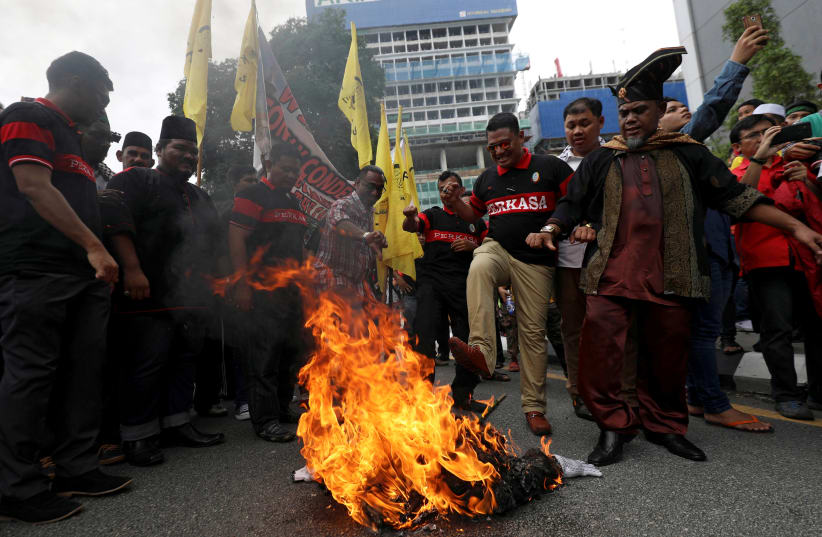
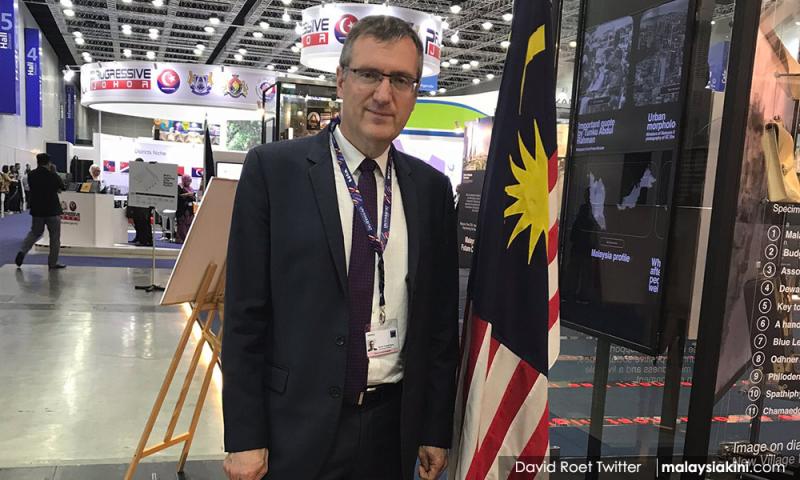
A delegation of Israeli diplomats recently made a visit to Malaysia that marked the first of its kind, to attend a United Nations conference this past week.
This is according to Israeli media, who received confirmation on the matter from the country’s Foreign Ministry.
The Times of Israel quoted Israeli Foreign Ministry spokesperson Emmanuel Nahshon last night as saying that a senior-level Israeli delegation had attended a week-long conference in Kuala Lumpur hosted by the United Nations Human Settlements Program, also known as UN-Habitat.

The delegates were attending the ninth Urban World Forum, which was held at the Kuala Lumpur Convention Centre from Feb 7 to 13.
They were led by David Roet, who was formerly Israel’s deputy ambassador to the UN, said the news portal.
Quoting a TV report in Israel, it said that Malaysia was “compelled to host the Israelis”, as it was required to grant visas to all delegations so that it could hold the international conference.
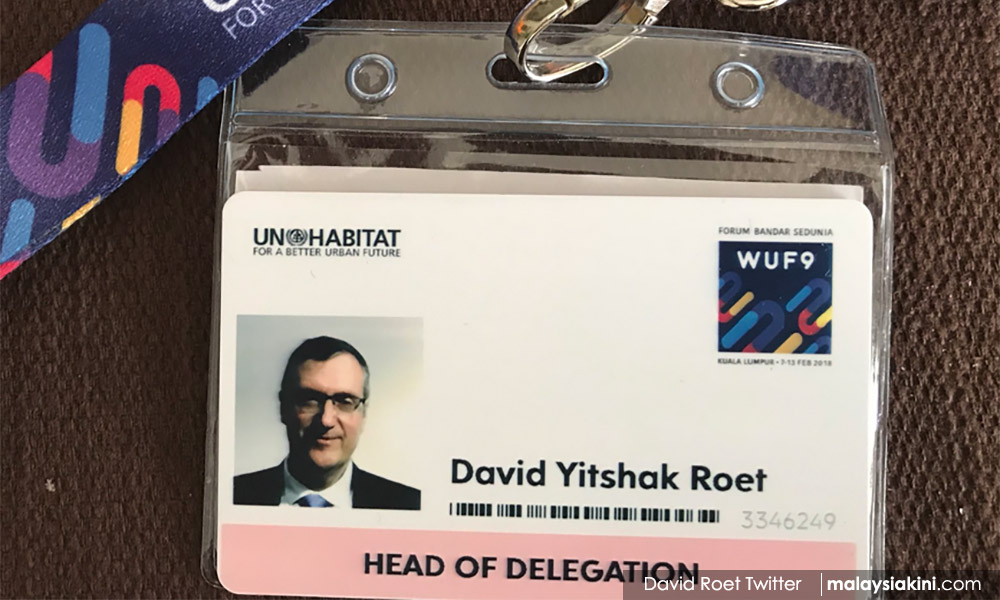
The Israeli Foreign Ministry also said that Roet entered Malaysia with an Israeli diplomatic passport, participated in the conference with other Israeli representatives, and also met Malaysian officials.
Malaysiakini is currently attempting to contact Wisma Putra and is awaiting their response.
Meanwhile, Roet posted a series of tweets on his personal Twitter account about his visit to Malaysia.
“Proud to have led Israel’s official delegation to UN’s international World Urban Forum 9 meeting in Kuala Lumpur, Malaysia.
“Unique experience for an Israeli diplomat to visit Malaysia. I have great hopes for good relations between our two countries in the future.
“Found many similarities between Israelis and Malaysian(s). A multifaceted society of people from different backgrounds working together for a better future,” he said in the tweets.
2. Unique experience for an Israeli 🇮🇱 diplomat to visit #Malaysia . I have great hopes for good relations between our two countries in the future. pic.twitter.com/2XOZfJGc9b — David Roet🇮🇱 (@DavidRoet) February 12, 2018
Malaysia does not have any formal diplomatic relations with Israel and has maintained a staunch pro-Palestinian policy.
Please join the Malaysiakini WhatsApp Channel to get the latest news and views that matter.
Do I need a visa to visit Malaysia?

Feb 19, 2022 • 5 min read
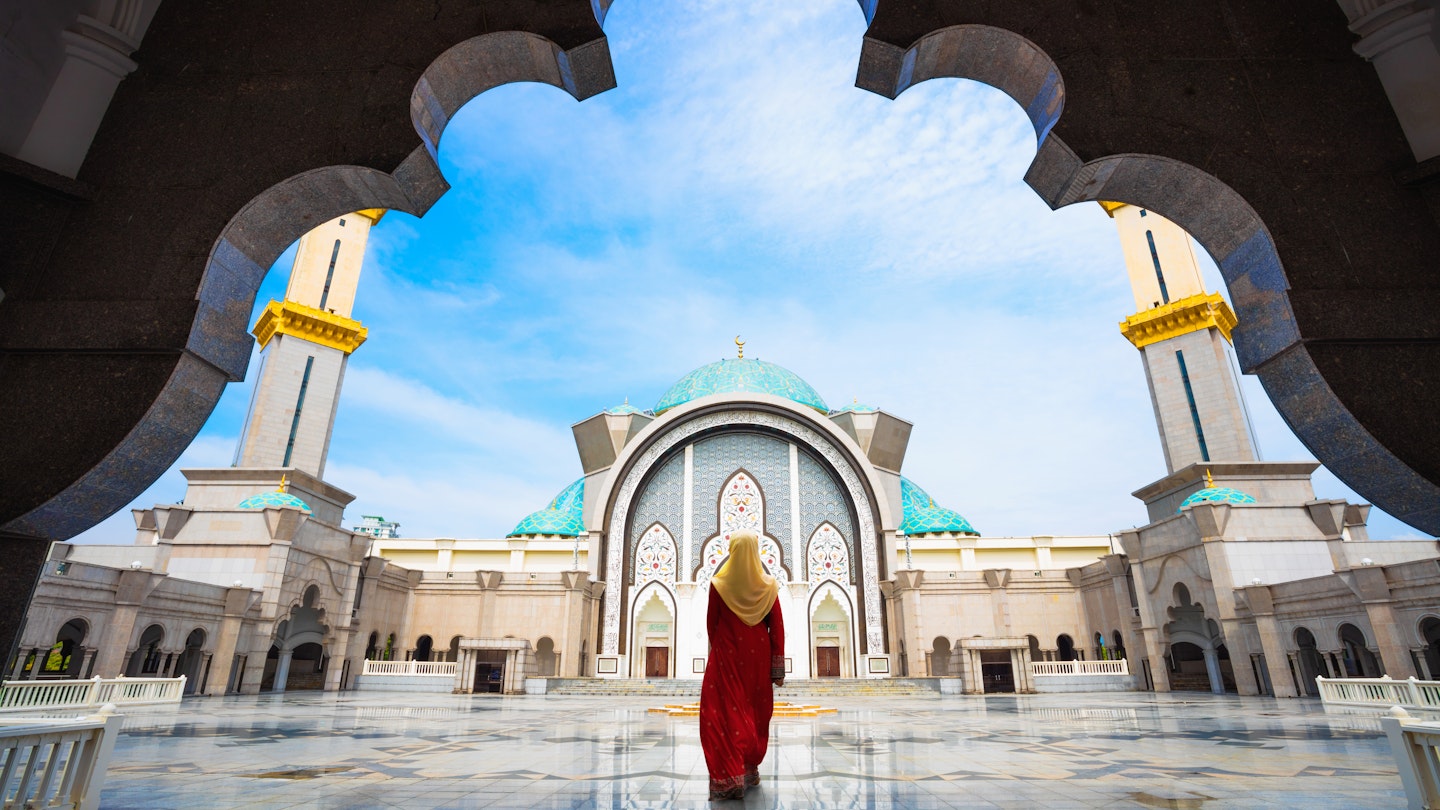
Entering the Federal Territory Mosque in Kuala Lumpur © Patrick Foto / Getty Images
Malaysia has a reputation as the easy country for travel in Southeast Asia, and that certainly applies to the visa situation. Citizens of many countries are granted visa-free entry on arrival, meaning there’s no complicated paperwork standing between you and Malaysia’s beaches, jungles and food markets.
Even better, the relaxed visa situation makes for easy detours to neighboring Singapore , Indonesia , Brunei and Thailand , though you’ll need to check the latest Covid restrictions before you travel. Here’s everything you need to know about visas for Malaysia.
Can I travel to Malaysia without a visa?
In normal circumstances, nationals of most countries in Europe, the US, Canada, Australia, New Zealand, Japan (and many other countries) can visit Malaysia without a visa for a stay of up to 90 days. This applies to entries by air, land and sea.
In practice, 90-day stays are usually given as the default if you arrive in Malaysia by air, but if you enter by land or by sea, you may be given a 30-day entry stamp unless you specifically ask for a longer permit. It’s worth doing this, as extending your stay may not be possible once the stamp is issued.
On arrival, your passport will be stamped and you’ll need to fill out an arrival/departure card; just make sure your passport is valid for six months from the date of entry. Technically, the authorities can ask for proof of sufficient funds for your stay and a ticket for onward travel from Malaysia, but this is not usually requested.

Some countries are granted a shorter stay in Malaysia
Citizens of Russia and many neighboring countries are granted a stay of one month on arrival, and similar rules apply to nationals of many countries in Africa and Central and South America. For longer stays, you’ll need to apply for a visa.
Note that citizens of Israel can only enter Malaysia with written permission from Malaysia’s Ministry of Home Affairs , which rules out easy overland trips from Thailand to Singapore.
What are the visa requirements for Malaysia?
If your home country is not on the visa-free travel list, or you’re planning a long stay, you’ll need to apply for a visa. However, be aware that the only visas valid for more than 90 days are the multi-entry visas reserved for business travelers.
Different rules apply to different countries. Tourist E-Visas lasting up to 30 days are issued to citizens of Serbia & Montenegro, China, India, and many other nations in South Asia and Africa. See the Immigration Department of Malaysia website for details of how to apply and a full list of approved countries.
Other nationals will need to apply for a visa the old-fashioned way at a Malaysian embassy or consulate in their home country. The Malaysian Ministry of Home Affairs has a full list of Malaysian missions overseas; contact your local embassy for advice on the application process.
Business and transit visas for Malaysia
For business trips, it’s usually fine to enter the country as if you were a tourist, but you are not permitted to work for any Malaysian company. Business travelers can also apply for long-duration multiple-entry visas, but the application process is complex – Malaysian embassies can provide details.
Transit visas are also available, but as so many people can enter Malaysia without a visa, they’re rarely needed.

What are the rules for travel to East Malaysia?
Sabah and Sarawak – the two Malaysian states on the island of Borneo – retain a certain degree of control over their borders. Even if you arrive from Peninsular Malaysia, you must go through passport control and have your passport stamped. This also applies when traveling between Sabah and Sarawak via Brunei, and when traveling to the federal district of Pulau Labuan.
When entering Sabah or Sarawak from another part of Malaysia, your new visa stamp will be valid only for the remainder of the period you were granted when you first entered Malaysia. If Malaysian Borneo is your first port of call in Malaysia, you’ll get the full, uninterrupted 30 or 90 days.
Extending a Malaysia visa
While the entry procedures for Malaysia can seem very relaxed, it’s important not to overstay your visa or the visa-free entry period. If you do, you can be detained, fined, deported, and blacklisted – it’s no laughing matter.
In the past, it has been possible to extend a 30-day entry up to 90 days through the Immigration Department of Malaysia , but don’t rely on this being possible with the pandemic muddying the waters. Extending a 90-day stay is out of the question.
The good news is that it is possible to prolong your stay in Malaysia by hopping across the border to a neighboring country. When you re-enter, you’ll be granted a new 30- or 90- day entry stamp on arrival. There’s rarely a problem if you do this once or twice, but the authorities may take a dim view if you repeat the so-called “visa run” too many times.
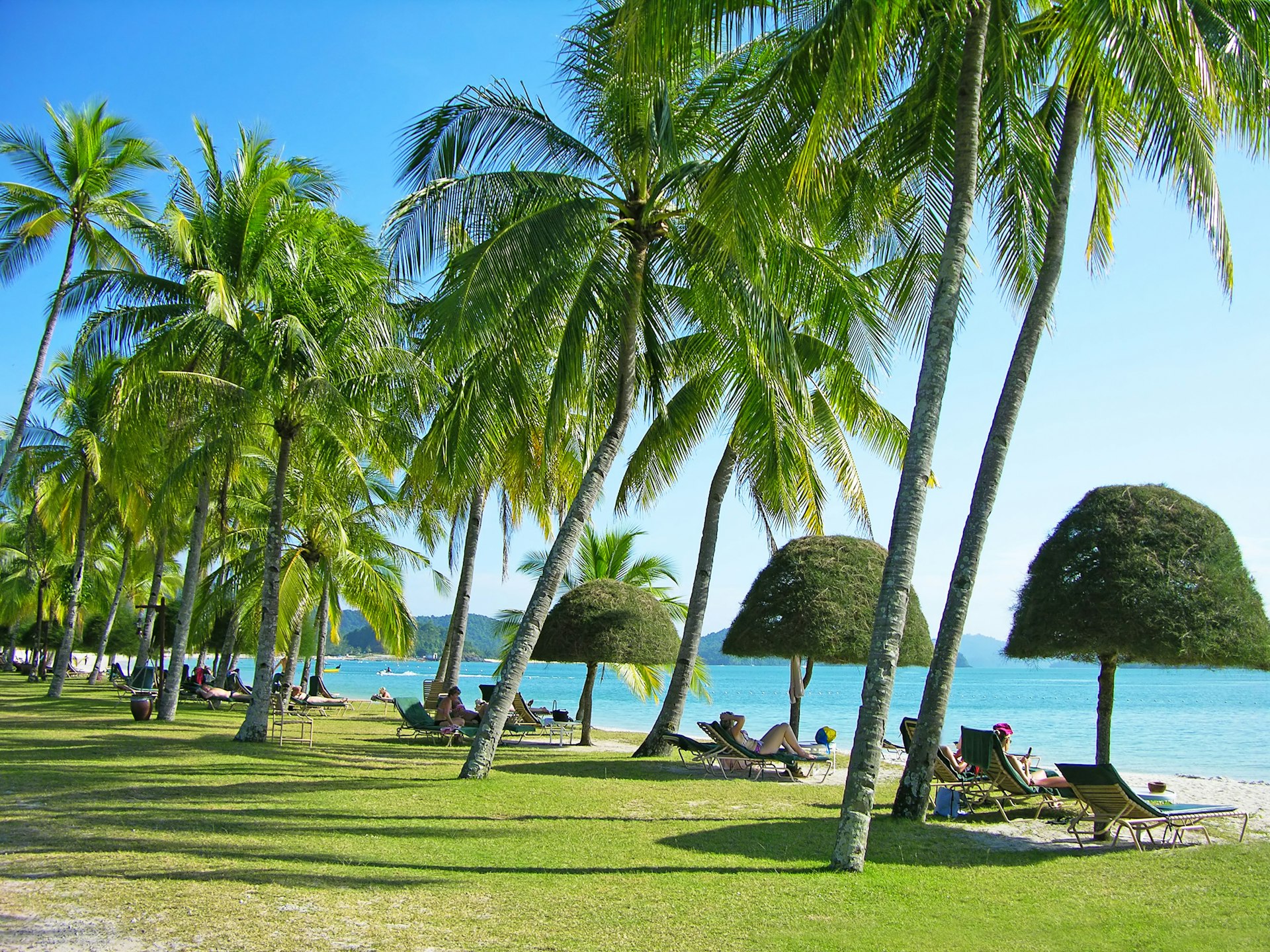
On the peninsula, the easiest place to leave and re-enter Malaysia is Johor Bahru ; local buses buzz across the causeway to Singapore day and night. The other easy option is Pulau Langkawi , which has ferries to Satun (year-round) and Ko Lipe (November to May) in Thailand.
Alternatively, consider crossing the Thai border by train at Padang Besar, or take the ferry to Sumatra in Indonesia from Melaka or Johor Bahru. In East Malaysia, you can cross by bus or boat into Kalimantan in Indonesia, or make the easy hop into Brunei by bus from either Miri or Kota Kinabalu , or by boat from Pulau Labuan.
You may also like: 12 best things you have to do in Singapore The 15 best things to do in Malaysia: Mountains, marine life, and amazing apes 'Ghosts are a big part of life in Malaysia': healing one year after losing my parents to COVID
Explore related stories
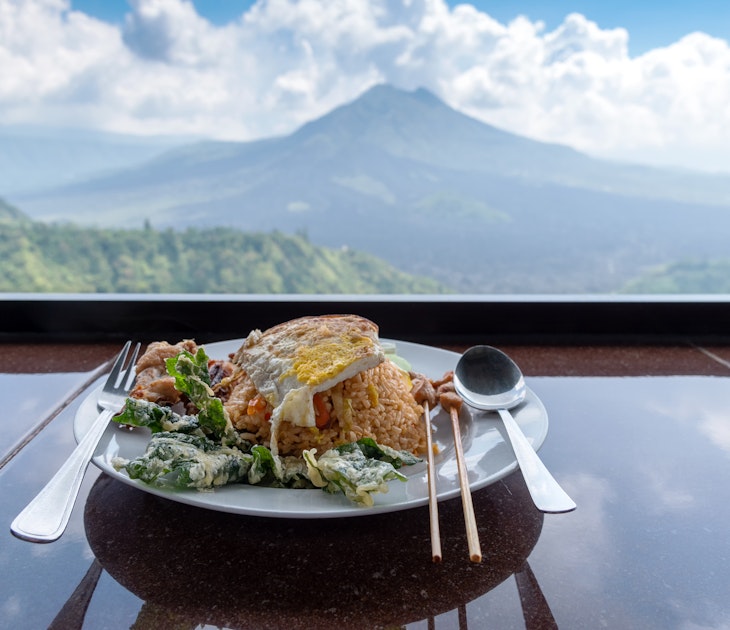
Tips & Advice
Apr 29, 2024 • 6 min read
Explore Indonesia’s diverse culinary landscape across the world's largest island nation, from satay to the globally renowned beef rendang.
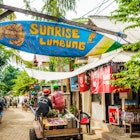
Apr 18, 2024 • 5 min read
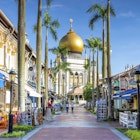
Apr 16, 2024 • 12 min read

Apr 8, 2024 • 6 min read

Apr 6, 2024 • 6 min read

Mar 9, 2024 • 6 min read

Mar 8, 2024 • 5 min read

Mar 8, 2024 • 6 min read

Feb 23, 2024 • 7 min read

Feb 9, 2024 • 12 min read

Op Eds & Articles
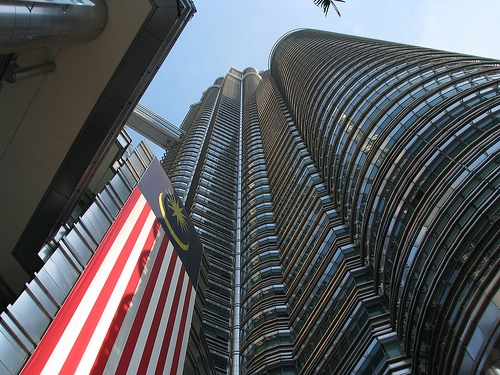
Aiman Zarul is a visiting student at Columbia University, New York. He was previously with the political section at the European Union Delegation in Malaysia, and is a founder of the Caucus for the Improvement of Malaysia-Israel Relations that advocates culturo-religious cooperation between Muslims and Jews through Malaysia-Israel engagement in economics, politics and social interaction.
Read the second article in this series
“The Israeli commandos shot the activists point blank and even from the back, and this is an act of a coward that cannot be forgiven. These blatant acts occurred because the world gangsters, Israel, feel they are protected by a world power.”
– Malaysian prime minister Najib Razak on Israel’s interception of the Gaza Flotilla, June 2010.
A scathing indictment by any measure, it was not always like this. For in its formative years, independent Malaya (which attained independence in 1957 and subsequently became present-day Malaysia in 1963) and Israel shared a cordial, if furtively unofficial, relationship that came short of full diplomatic ties. As the 1960s progressed however, the exigencies of Southeast Asia’s geopolitical architecture presented by an openly hostile and pro-communist Indonesia to the south and west as well as a revanchist Philippines to the east compelled Malaysia’s leaders to look to ideologically-consonant and co-religionist monarchies in the Arab world for support and legitimacy – receipt of which expectedly came at the price of Malaysia’s sinful soirée with Israel.
Yet, since Malaysia abnegated all direct contact with Israel in 1965, and notwithstanding its enduring antipathetic stance towards the Jewish state (particularly during the 1981-2003 premiership of Mahathir Mohamed), Malaysia has all but unequivocally ruled out all prospects for relations with Israel in categorical terms. From an Israeli perspective, this may indicate some discomfitingly opaque possibility for engagement at some unspecified point in the future, but it should not generate much surprise. On the contrary, whilst the constitution of Malaysia’s political arena makes routine excoriations against Israel an electorally expedient enterprise, a closer look at the kinds of forces that drive Malaysian politics reveals that it would not only be impertinent for Malaysia to categorically abjure all semblances of engagement with Israel, but even harmful to contemporary conceptions of Malaysian national security that have tended to encompass the welfare and security of the greater Muslim ummah.
Whither, Pragmatism?
Far from disregarding all accepted bounds of political reason, Malaysia’s 45 year-strong intransigence raises an interesting premise. By eschewing relations with Israel and by openly admonishing Israel for its perceived injustices towards the Palestinians, one could contend that Malaysia is sacrificing a considerable degree of foreign policy pragmatism in order to uphold a far loftier and urgent cause that transcends contrastingly bagatelle questions of Semitic-oriented preferences: the preservation of its Western-aligned pluralistic political fabric that champions secularism over fundamentalist theocratism and which derives its existential logic from such Euro-American concepts as constitutionalism, the rule of law and accountable government. If this argument holds any credence, then by doing the “dirty work” of erecting an antipathetic façade against Israel (and in a much more nuanced way, Israel’s political benefactors in the West), the ruling National Alliance government is effectively genuflecting the religiously conservative and outspokenly pro-Palestinian Muslim Malay majority, and hence removing from the professedly anti-secular Islamic opposition’s political arsenal a highly valuable and efficient electoral weapon: depiction (irrespective of accuracy) of the ruling coalition as both a client of Israel and an accommodationist to Zionist aspirations. There is no doubt that an ascendance to political prominence by the Islamic opposition (a feat that has largely eluded it since the inception of organized politics in Malaysia) will put tremendous pressure on the government to ratchet up its relatively benign and sporadic anti-Israel/-Zionist rhetoric from a level sufficiently and practicably serves its ad hoc political needs to a more pronounced policy of unequivocal anti-Semitism that encompasses a much broader scope of anti-Western posturing.
Presently, as a means of deflecting pugnacious charges of institutionalized anti-Semitism that threaten to scupper Malaysia’s much-vaunted aspirations of joining the rung of economically advanced nations by 2020, the National Alliance government moderates its stance towards Jewry in general, harnessing international media opportunities –often painstakingly– to portray itself as friends of ultra-orthodox, anti-Zionist Jewish congregations such as the charedi Jews (the Neturei Karta group being one such prominent embodiment) and personalities such as Professor Noam Chomsky. At the Peace in Palestine conference held in the Malaysian administrative capital, Putrajaya, in March 2005 for instance, there was a broad consensus among the six charedi academics and religious figures specially invited by the Malaysian government to represent the Jewish anti-Zionist lobby (including five Israeli nationals) that Zionism represented the singular root cause of the decades-old Israeli-Palestinian confrontation; the charge sufficiently cogent to warrant an endorsement of the conference’s resolution calling for the selective boycott of and divestment from all forms of Israeli economic activity. Likewise, when a senior Malaysian government official made anti-Semitic remarks in October 2008, it was the unsavory prospect of the egregious remarks blotching Malaysia’s image in the eyes of its foreign trade partners rather than any undesired domestic political implications that prompted Prime Minister Abdullah Badawi’s administration to speedily sanction the official in a rare public display of dissociation by the government from the actions of one of its rank and file. Needless to say, the indeterminable nature in which official attitudes to Israel have shifted over the last few years – from one of unflinching, obstreperous opposition to a qualified albeit grudgingly silent acceptance of Israel’s legal existence– has polarized members of Malaysian academia and ordinary Malaysians alike, opened an intellectual chasm in the popular Malaysian consciousness over questions of Israel’s legal status as a nation-state (which is gaining greater acknowledgement as more Malaysians receive Western legal educations that align them with Westphalian notions of state sovereignty) vis-à-vis its moral legitimacy as an ethno-theological construct, and sparked once non-existent debates on Israel’s place in an evolving Malaysian foreign policy.
Unremarkable as it may otherwise seem, the government’s nuanced recognition of this ‘legal-moral’ debate betokens an incipient calculativeness in Malaysian foreign policymaking: a calculativeness that is consistent with the Malaysian foreign policy conceptions sketched by region experts such as Michael Leifer, Shanti Nair and Helen Nesadurai that locate political survivability at the center of most if not every foreign policy maneuver. Malaysia’s foreign policymakers do not enjoy the luxury of being able to indulge in foreign policy experimentation and risk-taking, especially where such adventurism runs the risk of tarnishing the country’s cherished Islamic identity. The leveling-out of the domestic political playing field since 1998 has accentuated the Israeli-Palestinian conflict’s ideological significance for both sides of the political spectrum, and since 1998 Malaysia observers have been treated to a deft display of realpolitik by the country’s political elite, the latter adeptly varying its anti-Israel tempo in rhythm with fluctuations in the electoral fortunes of the Islamic opposition – whilst leaving the door just sufficiently ajar to allow for intermittent and tacit exchanges between Kuala Lumpur and Jerusalem (the July 2009 meeting between the Malaysian and Israeli defense ministers in Paris was just one, though certainly not the first, such episode). Moreover, this is all happening against the backdrop of an unchanging official policy that conditions any form of bilateral engagement on a seismic shift in the Palestinian status quo that would sufficiently temper Malay opposition to a dialogue with Israel.
By this account, contrary to the views of skeptical Malaysia observers, pragmatism as a defining quality in Malaysian foreign policymaking did not tumble into a precipitous decline with the ouster of Israel’s sole Malaysian representative in 1965, and can even be said to have flourished in the face of Mahathir’s twin Islamic revivalism and Islamic internationalist policies in the 1980s and 1990s as well as the inertia years of the Badawi administration to remain very much extant today. How do we explain this pragmatism? One method involves the use of a closed causal model that preconditions any Malaysian engagement with Israel on the acceptance by the electorally dominant Malay Muslim community of Israel’s legal and normative legitimacy, the attainment of a permanent and satisfactorily comprehensive outcome in Palestine being the sine qua non of this acceptance. In other words, so long as the Palestinians are seen to being accorded an objectively just settlement of their political and territorial grievances with Israel that is both durable and sufficiently comprehensive, this causal model presupposes that Malaysia’s Malays will rationally conclude that Israel has expiated for what former Foreign Minister Shlomo Ben-Ami calls its “original sins”, and would consequently be deserving (so to speak) of Malaysian diplomatic outreach. For the Malaysian government, this would be the popular mandate for it to commence direct and open dialogue with the Jewish state.
It’s Hard Being Pragmatic
But as the realities of our arguably Westphalian era have demonstrated time and again, infallible pragmatism in foreign policymaking is an illusory enterprise and as useful as hypothetical models such as the aforementioned causal model may be in gauging the foreign policy responses of individual states as an amplification of national consensuses, such explanatory devices along with the assumptions that undergird them are far from watertight. Discrepancies within our own model present us with two particular challenges.
For one, what sort of “satisfactorily comprehensive outcome” are we talking about? Where should the attendant thresholds be set? Whilst the Malay race is unique in its religious homogeneity (the Malaysian constitution defines a Malay as, inter alia, an adherent of the Islamic faith), the inveterately religious constitution of the Malay psyche has in recent decades been subjected to a massive political conditioning exercise counter-waged by the two opposing political camps. This conditioning has, apart from ideologizing the otherwise apolitical Malay character, produced a tendency for varying individual interpretations of Islam to coexist with a political heterogeneity that itself is liable to religionization. Different cross-sections of Malay society across the economic spectrum harbor divergent perceptions of the Middle Eastern geopolitical reality, and differences in the value orientations of each cross-section’s constituents in turn affect both the rationality of their responses to displays of Israeli continence as well as their pliability to the Malaysian government’s own responses to Israeli wherewithal. Whilst a conceivable proportion of Western-educated, middle class and cosmopolitan Malays may see a ‘post-Palestine’ Israel as a potential reservoir of commercial and touristic opportunities (save for certain restrictively narrow exceptions, Malaysian law bars Malaysians from entering Israel) and are more likely to dissociate inherently private norms of spirituality from the corruptible temporal principles of secular politics, Malays who occupy the lower rungs of the economic order are just as likely to view Western democratic-capitalist culture and the globalization movement as dangerously antithetical to Islamic values, and are also more likely to oppose any efforts towards normalizing relations with Israel on the premise that it would betray God’s perceived material favor towards Malaysia and abnegate on Malaysia’s self-assigned obligations, formulated during the Mahathir era, to the greater global ummah that cut across secular notions of citizenship and sovereign territoriality.
The ensuing sensitivity surrounding the question of normalization has stymied the arguments of the pro-normalizationists and further buttressed the efforts of anti-normalizationists in preserving the status quo. Taking over the reins of government over a burgeoning civil society, the administration of Prime Minister Najib Razak (who assumed the premiership in April 2009) has promulgated sweeping intramural reforms within the governing coalition and prioritized outreach to the Malay intellectual class who had felt alienated by the conservative policies of Prime Minister Badawi and consequently re-aligned themselves with the with the ostensibly liberal agendas of the opposition coalition. But it embarks on this self-reinvigoration campaign in the knowledge that sacrificing any measure of support from its core, grassroots Malay working class constituency in order to appear more palatable to the Malay intellectual class bears neither short- nor long-term viability due to the immense electoral leverage wielded by the Malay working class. In the present Malaysian government we thus see a cautious balancer who is careful to avoid being seen as setting anything remotely resembling a tangible threshold of “satisfactoriness” that risks being rejected by anti-normalizationists and derided by the Islamic opposition on the one hand, and dismissed by unimpressed pro-normalizationsists as “too little too late” on the other. At best, it has purposively attempted to articulate the “comprehensive settlement” condition in oblique terms in a bid to appease pragmatists and those who see the present state of Malaysia-Israel relations as untenable.
Missed Opportunities
Whereas the period immediately following the 1993 Oslo Accords between Israel and the Palestinian Liberation Organization witnessed a number of Muslim states take exploratory steps towards relations with Israel (the most prominent of course being Jordan in 1994), Malaysia opted to demur, its Deputy Foreign Minister stating in parliament in October 1995 that
Though Malaysia believes that the implementation of the peace treaty between Palestine and Israel is encouraging, however at this time Malaysia is not yet prepared to have official relations with Israel. Malaysia had even prior to this wished to see Israel fully implement all agreements made with the Palestinians before it can make any decisions on having relations with Israel.
It was against a backdrop of pervasive optimism emanating from the events in Oslo that Malaysia found itself confronted for the first time since the 1960s with the prospect of establishing relations with Israel. Unlike his Indonesian counterpart, Abdurrahman Wahid, who received Prime Minister Yitzhak Rabin in Jakarta in October 1993, Mahathir elected to buck the emerging trend of détente with Israel, choosing instead to underscore the centrality of the “comprehensive solution” condition to any Malaysian intervention. By relegating the Oslo Accords to an inchoate role in the process of complete disabusement of Palestinian indignity, the Mahathir administration managed to circumvent the politically inhospitable territory associated with reassessing the realities of Malaysia-Israel relations. Yet, as a series of positive Malaysian gestures interspersing the Oslo Accords and the 1997 financial crisis illustrate (ranging from an uncharacteristic tolerance of Rabin’s Singaporean and Indonesian visits in 1993 to Malaysia’s hosting of the Israeli national cricket squad in 1997), a different game was being played behind the scenes, with the Malaysian foreign policymaking apparatus testing the proverbial waters ahead of a possible dialogue with Israel that would take place within the secure contours of a burgeoning economy and political longevity of Mahathir’s National Alliance administration.
The end of Israel’s so-called liberal honeymoon and the accession of Benjamin Netanyahu’s conservative Likud party in 1996 dislocated any nascent Malaysian optimism for bilateral dialogue cultivated in the dying days of Israel’s Labor administration. Netanyahu’s paradigmatically opposite approach to Israeli-Palestinian interaction diminished Malaysian appetites for further experimentation and ushered in a renewed phase of perceptive dissonance that drove home the injunctions of anti-normalizationists. The 1997-8 Malaysian economic crisis fomented a perceptible nationalism that derived much of its rationale from an officially-endorsed vilification campaign against Jewish American financier George Soros and which (in)famously culminated in Mahathir’s polemical “Jews rule the world by proxy” address in 2003. Against this hostile backdrop, Malaysia again found itself confronted with the prospect of engaging Israel in the wake of Israel’s disengagement from the Gaza Strip in August 2005. Just as in 1993, this Israeli gesture provided barely enough maneuvering space for several Muslim states, most notably Pakistan, to tease out avenues for improved relations with Israel. As in 1993, Malaysia remained impassive, Foreign Minister Syed Albar intimating more dismissively than in 1995 that “we shouldn’t simply consider that the problems in (the Palestinian territories) have been solved because of the Gaza pullout, which is a small step”. Israel’s attempt to use the Gaza disengagement as a foreign policy stimulant in Southeast Asia’s Islamic heartland appeared to fall on itself, its Malaysian interlocutors in particular finding themselves to have reached a point inhospitable to dialogue from which it was proving prohibitively difficult to extricate.
Outside Influences
The other problem, and one that goes some way to explaining the observed variance in Malaysian foreign policy attitudes, is that our causal model is not closed in reality. External players, influences and obligations are invariably at play, some of which may serve to detract –however inadvertently– Malaysian foreign policy from the pursuit of national interests undiluted by external imperatives. Some of these extraneous influences are readily discernable: the permeation of values rooted in Arab political culture and Islamic norms into Malaysia’s decision-making apparatus, Malaysia’s growing involvement in the global Islamic discourse and Kuala Lumpur’s desire to preserve its influence and prestige within multilateral fora such as the Organization of the Islamic Caucus (OIC), the Non-Aligned Movement (NAM) and the Developing 8 group of pioneering Islamic economies. In addition, there is Malaysia’s South-South and ‘Look East’ posturing that is arguably more reflective of the social justice and Third World activism of the Mahathir administration than of any narrower interests-based imperative.
In many senses, the permeation of moderate Islamic influences throughout the various streams of Malaysian public life should be viewed as a laudable phenomenon at best, and an innocuous development at the very least. The twin pressures on the establishment to embrace seemingly antithetical Islamic and Euro-American values has led it to construct a moderate and progressive Islamic ethos that co-opts technological innovation and pluralist ideas – the active promotion and exportation of which has portrayed Malaysia as a responsible, socially sustainable and ideologically neutral par excellence of progressive Islamic state. Nonetheless, expanded Malaysian identification with what Islamologists such as Bassam Tibi, Amr Sabet and Peter Mandaville term Islamist internationalism comes at a price; a disproportionate emphasis on an idealistic foreign policy that draws heavily from religion and other considerations exogenous to orthodox international political practice affects the strategic logic and efficacy of Malaysian foreign policy choices and potentially compromises Malaysia’s long-standing commitments to the universalist values of organizations such as ASEAN, the Commonwealth and even NAM – all in whom Malaysia can trace a long and illustrious membership.
Pragmatism at any Cost?
In the end then, for the necessary conditions permitting Malaysia-Israel engagement to arise, the divergence of our closed causal model from the empirical reality needs to be considerably narrowed. Essentially, two processes need to take place.
The first is a process of education. Recognizing that Malaysian foreign policy is overwhelmingly driven by domestic political currents, the Najib administration should make a purposeful attempt to rein in widespread preconceived perceptions of Judaism and even Zionism as being nefarious, anti-Islamic enterprises. Ideally, related initiatives should incorporate educational and awareness-building tools that will help engender the necessary perceptive rupture. This must be a holistic effort that identifies and reforms those underlying sources of Israelphobia that are grafted into social institutions: the national educational curriculum that caricatures Israel as the execrable dross left behind by retreating colonial powers, media orientations that are ideologically tilted against Israel’s oft-labeled “Zionist regime”, and censorship laws that are lax towards patently anti-Semitic publications and literature that explicitly endorses the militant methodologies employed by Hamas and Hezbollah. Unconstructive vilification of Israel on its own merits fails as a sustainable policy tool and actually does more harm by hardening hostile attitudes towards Jews and Israel to the detriment of a constructive Malaysian role in the Middle East peace process. The recent political clamor over the nuanced similarities between the Najib administration’s 1Malaysia program and former Israeli prime minister Ehud Barak’s One Israel movement illustrates how even banal and adventitious allusions to the Israeli state can perpetuate inherently local socio-political rifts. To be sure, a shift in Malaysian attitudes will also be contingent on the kinds of signals emitted by Israel in its own dealings with the Palestinians, and whilst events such as the 2005 Gaza disengagement may strengthen the case for Malaysian entertainment of Israeli requests for relations, such pockets of opportunity are easily undermined by sudden turns of events. The interception in May 2010 of the Gaza-bound aid flotilla vessels Mavi Marmara and Rachel Corrie, the detention and subsequent expulsion of seventeen Malaysians and a violent backdrop of the loss of nine lives for the first time directly exposed Malaysians to Israel’s security machinery, and notwithstanding Israeli justifications of events, provided the impetus for mobilizing all outlets of Malaysian society across the ethnic compass against what was seen to be the most glaring illustration yet of Israeli iniquity.
The second is a process of policy reappraisal. The Malaysian government should re-conceptualize the political context in which it recognizes a nascent Palestinian state. Crucial to this is a recognition on the Najib administration’s part that the shifting realities of the Israeli-Palestinian relationship, distorted by the bifurcation of the Palestinian territories into two noncontiguous and politically fractious entities, have rendered previous Malaysian governments’ policies of activist opposition to Israel on behalf of a single Palestinian polity largely redundant. Malaysia’s policy of recognizing both the West Bank-based Palestinian Authority of Mahmoud Abbas and the Hamas administration in the Gaza Strip conveniently avoids the opprobrium of having to endorse one Palestinian polity (along with its attendant civil structures) over the other, depoliticizes Malaysian interest in Palestinian affairs and allows Malaysian leaders the moral vantage of being able to claim representation of all Palestine. But the robust relationship with the Hamas administration that this state of affairs facilitates risks harming Malaysia’s relations with its moderate Arab partners and Western allies. Similarly, Malaysia’s monetary, humanitarian and technical assistance to non-partisan causes may appeal to ordinary Palestinians on both sides of the factional cleavage, but this approach is centered more on crisis alleviation than crisis resolution
Malaysia needs to re-assess its policy, replacing its activist stance with a proactive approach that enables cooperation between Israel and a Muslim country such as itself in expanding Palestinian assistance beyond the limited parameters of humanitarian aid and into the unchartered realm of coordinated efforts in infrastructural improvement and capacity-building. Apertures of opportunity exist for Malaysian technical assistance in rationalizing Palestinian institutional bases and in eliminating rent-seeking, and until Palestine makes an internationally-mediated and peaceful transition to statehood Malaysia should explore every available avenue for an enhanced involvement in the Palestinian territories – including novel routes such as engagement with Israel. This way, Malaysia will not only be preserving its moderate, dynamic qualities for its own posterity, but will also be sharing the dividends of a similarly progressive diplomacy with the most important stakeholders of Middle East peace: Palestinians and Israelis, co-existing as two separate sovereign entities. Moreover, any fortuitous advances towards a Muslim-Jewish rapprochement that may result would come as a premium. Properly and rationally effected, a paradigm shift of the magnitude suggested above will invariably necessitate a re-evaluation of the embedded precepts and methodologies familiar to Malaysian policymakers, but I at least believe that the ground-breaking benefits to be had from this exercise make the short-term inconveniences that will incur a price well worth paying.

- Staff & Board
- Israel-Asia Leaders Fellowship
- Tailor-Made Leadership Programs
- Upcoming Events
- Past Events
Connect on social media
- Company/Organization *
- Email This field is for validation purposes and should be left unchanged.
- International
November 9, 2023 Israel-Hamas war
By Kathleen Magramo , Heather Chen , Nadeen Ebrahim, Ed Upright, Alisha Ebrahimji , Adrienne Vogt , Matt Meyer , Elise Hammond , Maureen Chowdhury and Tori B. Powell , CNN
Malaysia leader vows to maintain ties with Hamas, calls for solidarity with Palestinians
From CNN's Heather Chen
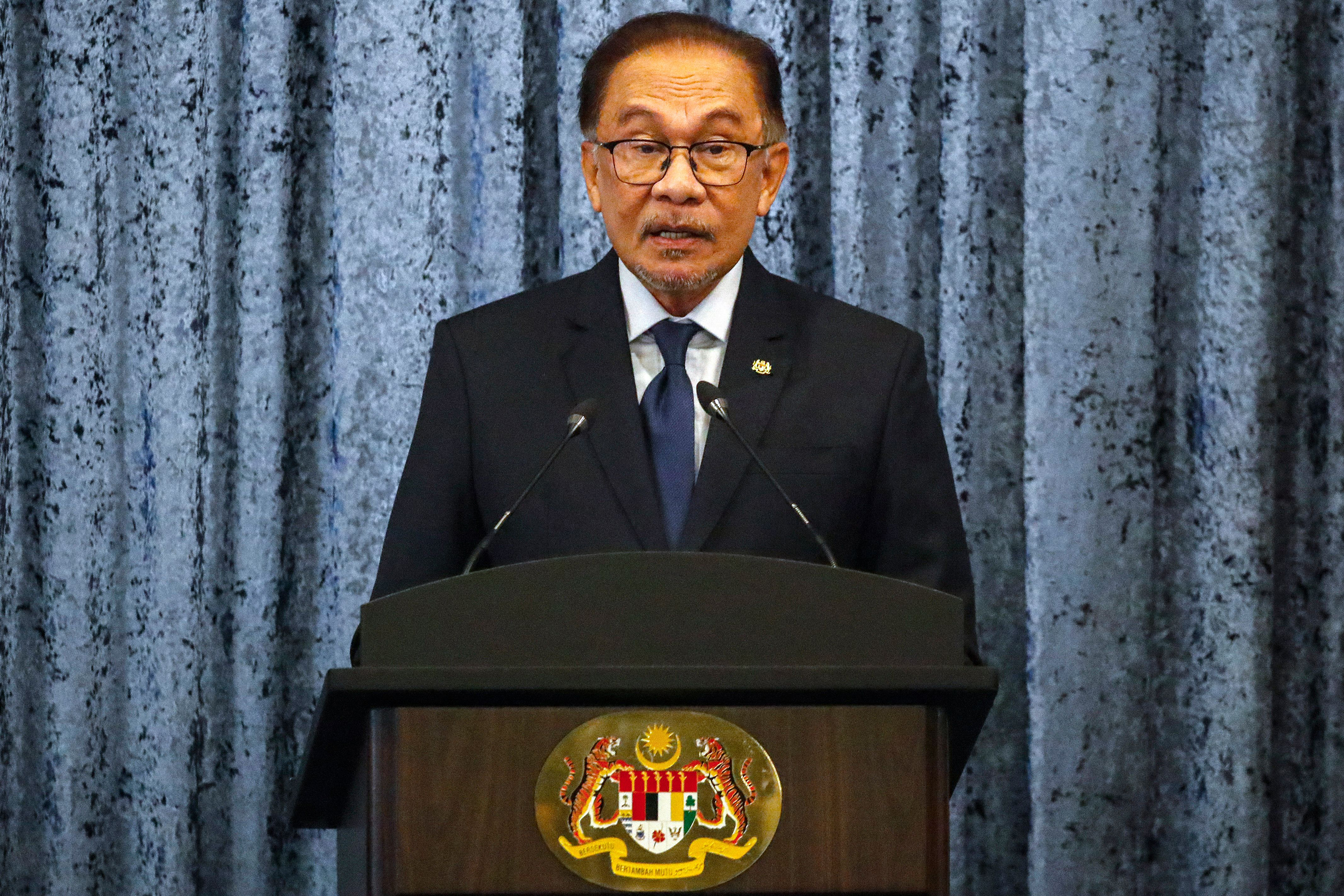
Malaysia will maintain ties with Hamas and will not “punish the group as a terrorist organization,” Prime Minister Anwar Ibrahim said Tuesday.
The comments were in reply to a lawmaker's question about whether Malaysia risks economic repercussions given calls in the United States — including a proposed bill — to clamp down on foreign supporters of the Palestinian Islamist militant group following its October 7 attack on Israel.
“I will not accept any threats,” Anwar said, referring to the Hamas International Financing Prevention Act, which passed the House of Representatives last week but still needs approval in the Senate.
Muslim-majority Malaysia, and neighboring Indonesia, like many Middle Eastern nations, has been a vocal supporter of the Palestinian cause for decades.
It has long maintained it will not diplomatically recognize Israel until a genuine two-state solution has been achieved giving Palestinians their own state.
Leading figures from Hamas — which is designated as a terrorist organization by the United States, the European Union and Israel — have previously traveled to Malaysia and met with government officials.
Anwar, who has personally championed the Palestinian cause since his days as a student protest leader in the late 1960s, has pushed back against pressure to distance his nation from Hamas and portrayed his government’s stance as part of a wider campaign to support the Palestinian people.
“Palestine is colonized through apartheid, ethnic cleansing and now genocide,” Anwar said during Tuesday’s parliamentary session. “Whatever happened is the legitimate right and struggle of the Palestinian people. “All parties and members of the public should show solidarity in the issue of Palestine, rather than using it for politics.”
Malaysia rallies: On October 22, thousands of Malaysians waving Palestinian flags and carrying banners calling for peace gathered in the capital Kuala Lumpur to express solidarity with Palestinians. Two days later, during a separate pro-Palestinian rally at Malaysia's national stadium, Anwar said he rejected pressure from Western countries to condemn Hamas.
“Malaysia is a fiercely independent country. We decide what is right,” he said on stage at the rally. “We want the Arabs, Palestinians and people of Gaza to be treated as human beings. Nothing more, nothing less.”
UN rights chief accuses Hamas and Israel of war crimes as civilians flee south. Here's the latest
From CNN staff
Hamas and Israel have both committed war crimes during the past month, the UN human rights chief said Wednesday.
Volker Türk also urged both sides to agree to a ceasefire to allow aid deliveries to Gaza, the release of hostages by Hamas, and to work toward an "end to the occupation."
Israel's military pushed back against war crimes accusations, saying its strikes on Hamas targets followed international law and sought to minimize civilian casualties.
Meanwhile, the United States and its G7 allies have repeatedly rejected calls for a ceasefire, putting them at odds with mounting calls from their Arab partners and international aid agencies.
Here's what else to know:
- Civilians flee south: Thousands of Palestinians are evacuating northern Gaza as Israel intensifies its ground offensive against Hamas in Gaza City. Some of them described an unbearable reality in the enclave's main urban center, with constant airstrikes and no water . A man who did not provide his name told CNN in southern Gaza that the war "left nothing safe — not churches, not mosques or anything." Israeli Defense Minister Yoav Gallant claimed Tuesday that IDF troops were operating in Gaza City, targeting Hamas infrastructure and commanders there.
- Dire humanitarian situation: Doctors in Gaza are running out of medical supplies , according to the International Committee of the Red Cross's chief surgeon, while all bakeries have been forced to close in northern Gaza due to a lack of fuel, water and wheat flour. The UN Relief and Works Agency (UNRWA) said it was able to deliver medical supplies to the Al-Shifa Hospital in Gaza City Wednesday despite "relentless bombardments."
- Louder calls for a ceasefire: The president of the International Rescue Committee called for a humanitarian ceasefire for at least five days , emphasizing it was the "absolute minimum" needed to allow aid agencies to relieve some of the suffering. Other world leaders have also called for a ceasefire or a "humanitarian pause" in recent days. US Secretary of State Antony Blinken reiterated US opposition however, saying, "Those calling for an immediate ceasefire have an obligation to explain how to address the unacceptable result that would likely bring."
- Hostage negotiations: A deal to secure the release of a large number of hostages that Hamas is holding in Gaza appears elusive, despite negotiations involving the US, Israel, Qatar and Hamas. The multi-party talks have been ongoing for weeks and have so far produced many ideas, but any proposal involving hostages in exchange for a pause in fighting is not on the table, a US official and other diplomatic sources said. IDF spokesman Rear Adm. Daniel Hagari said the military’s current count of hostages being held by Hamas is 239.
- Rafah border latest: The crossing between Gaza and Egypt was closed Wednesday due to a “security circumstance,” the US State Department said. A total of 637 foreign nationals were evacuated to Egypt Tuesday, an Egyptian official said.
- Gaza's future: The US believes the Palestinian Authority “is the appropriate place to look for governance eventually” of Gaza, a State Department official said Wednesday. That's in line with Blinken's comments that "Israel cannot occupy Gaza," but "there may be a need for some transition period at the end of the conflict." Israeli Prime Minister benjamin Netanyahu claimed this week that Israel will have the "overall security responsibility" in Gaza for an "indefinite period."
UN rights chief says war crimes have been committed by both Israel and Hamas
From CNN's Michael Rios

Both Hamas and Israel have committed war crimes since the conflict erupted last month, the UN High Commissioner for Human Rights said Wednesday.
“The atrocities perpetrated by Palestinian armed groups on 7 October were heinous, brutal and shocking, they were war crimes — as is the continued holding of hostages,” commissioner Volker Türk said. “The collective punishment by Israel of Palestinian civilians amounts also to a war crime, as does the unlawful forcible evacuation of civilians.”
Türk delivered the remarks after visiting the Rafah border crossing, which he called a symbolic lifeline for the 2.3 million people in Gaza.
“The lifeline has been unjustly, outrageously thin,” he said as he called for more humanitarian aid to be delivered to the enclave.
Türk also urged both sides to agree to a ceasefire on the basis of three human rights imperatives: the delivery of aid to Gaza, the release of hostages by Hamas as well as the implementation of “a durable end to the occupation, based on the rights of both Palestinians and Israelis to self-determination and their legitimate security interests."
“Even in the context of a 56-year-old occupation, the current situation is the most dangerous in decades, faced by people in Gaza, in Israel, in the West Bank but also regionally,” he said.
The Israeli military commented on accusations of war crimes saying:
"The IDF’s strikes on military targets are subject to relevant provisions of international law, including the taking of feasible precautions and after an assessment that the expected incidental damage to civilians and civilian property is not excessive in relation to the expected military advantage from the attack."
Videos released by Hamas show clashes with IDF in Gaza City
From CNN's Paul P. Murphy
Even though IDF forces have encircled Gaza City and spent more than a month targeting Hamas positions and tunnels, footage of attacks recently released by Hamas and analyzed by CNN help illustrate how difficult it will be to stop the Islamist militants.
CNN has geolocated a number of the clashes seen in the Hamas videos to three main locations: the Al-Shati refugee camp, Atatra and Beit Hanoun. The videos were released after the Israeli ground invasion began.
The remaining fights CNN was unable to geolocate were either in incredibly dense city streets or rural areas — mainly olive groves.
The overall success of the Hamas attacks depicted — whether the bulk of their fighters survive and whether they are causing IDF personnel casualties or disabling equipment — is unclear from the videos, which are heavily edited and redacted propaganda. Hamas only touts its successful missions in its videos.
However, Hamas publishing body camera footage of its fighters carrying out an ambush does indicate that at least one of their fighters survived and brought back footage.
CNN military analyst and retired US Lt. Gen. Mark Hertling reviewed the videos and said that Hamas was likely utilizing shape-charge rocket-propelled grenades, which have the potential to be specifically devastating to some military vehicles, like armored personnel carriers.
An IDF spokesperson declined to comment on the number of military vehicles that have been disabled or destroyed during the ground invasion, citing "operational security considerations."
"Whack-a-mole": Clearing Hamas' tunnels with weapons stockpiles and fighters inside will likely take months. Additionally, Hamas fighters can now also use the aftermath of the Israeli military strikes — the ruins of buildings — as cover to carry out their ambushes.
Hertling said that trying to stop these ambushes would be like "whack-a-mole" unless the IDF was able to knock out every single tunnel complex, tunnel opening or shaft.
"It's going to take months to do that," he said, noting that clearing operations can't be done by vehicles.
IDF soldiers will have to clear each building individually, which will expose them to rifle and sniper fire from Hamas and, in turn, risk a skyrocketing casualty rate.
Hamas says the videos were taken on November 2, 3, 5, and 6. A CNN analysis could not independently confirm that time period, but the length and direction of the shadows in the videos also indicate many of the ambushes either occurred on different days or took place many hours apart.
At most of the sites, Hamas fighters are seen carrying out multiple ambushes, at different times throughout the day.
IDF claims it destroyed 130 Hamas tunnel shafts in Gaza
From CNN's Tamar Michaelis in Jerusalem
The Israel Defense Forces on Wednesday claimed it has destroyed 130 Hamas tunnel shafts since the start of the war, as Israel continues the "expansion" of its ground operation in Gaza.
"Combat engineers fighting in Gaza are destroying the enemy's weapons and are locating, exposing and detonating tunnel shafts. With the expansion of the ground operation in the Gaza Strip, the soldiers are thwarting Hamas’ terrorist infrastructure," the IDF said in a press release on Wednesday.
"As part of the ground forces' activity in the Gaza Strip, IDF soldiers are currently working to expose and destroy Hamas’ tunnels," the statement said. "Since the beginning of the fighting, 130 tunnel shafts have been destroyed."
The IDF added that Hamas' "preparation for a prolonged stay in the tunnels can be seen based on water and oxygen means found in the tunnels."
School claim: One destroyed tunnel was near a United Nations Relief and Works Agency (UNRWA) sponsored school in the Beit Hanoun area of northern Gaza, the IDF claimed.
The IDF also shared a video allegedly showing the destruction "near the school" through a drone camera.
CNN cannot verify the IDF’s claims. CNN has reached out to UNRWA for comment.
"Nothing is left": Palestinians fleeing south in Gaza describe unbearable situation in Gaza City
From CNN stringer in Gaza and CNN’s Abeer Salman in Jerusalem
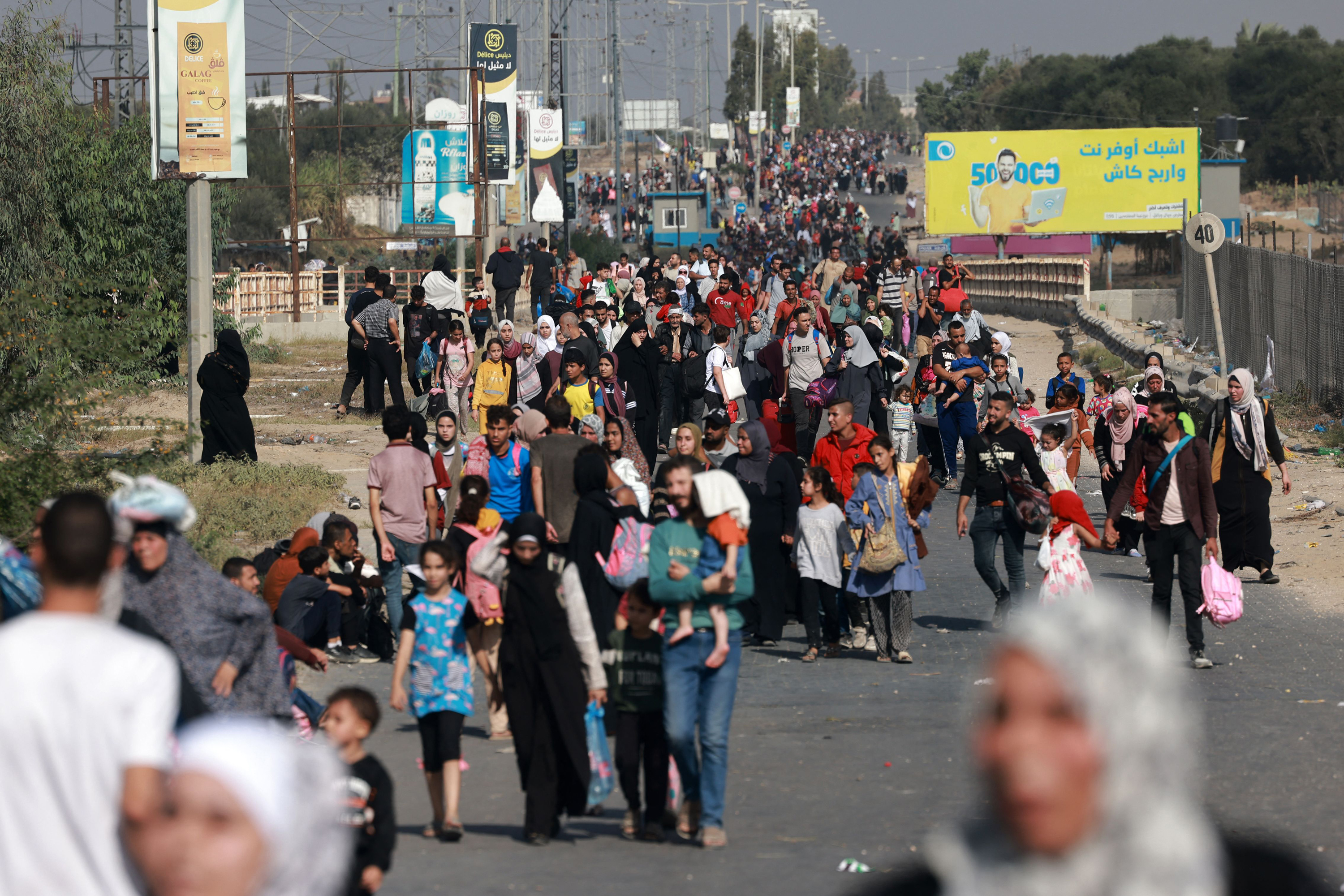
Thousands of Palestinians fled northern Gaza on Wednesday, traveling miles on foot through the battered enclave in a growing exodus prompted by Israel’s intensified ground and air campaign.
Streams of people — women, children, the elderly and disabled — made their way down Salah Eddin Street, one of the two north-south highways in Gaza, along an evacuation corridor announced by the Israel Defense Forces.
One teenage girl compared the mass movement to the “Nakba,” or catastrophe, the Arabic term for the expulsion of Palestinians from their towns during the founding of Israel.
A man who did not provide his name told a CNN stringer in southern Gaza that he and his neighbors had lived through “horrifying days.” He said they had left their home in northern Gaza and moved several times, but that it was impossible to escape the airstrikes.
“This war left nothing safe — not churches, not mosques or anything. Today, they dropped the leaflet ordering us to leave to the alleged safe area. Now we are beyond this area of Wadi Gaza, and we are still hearing bombardments. There is no safe place in Gaza,” he said.
“We are seven families. All of our houses are gone. Nothing is left. We couldn't take anything — no clothes, no water, nothing. The way here was very difficult. If something falls, you are not allowed to pick it up. You are not allowed to slow down. Dead bodies everywhere.”
Read more about Palestinians fleeing northern Gaza .
UN chief says something is "clearly wrong" with Israel's Gaza operation, pointing to civilian deaths
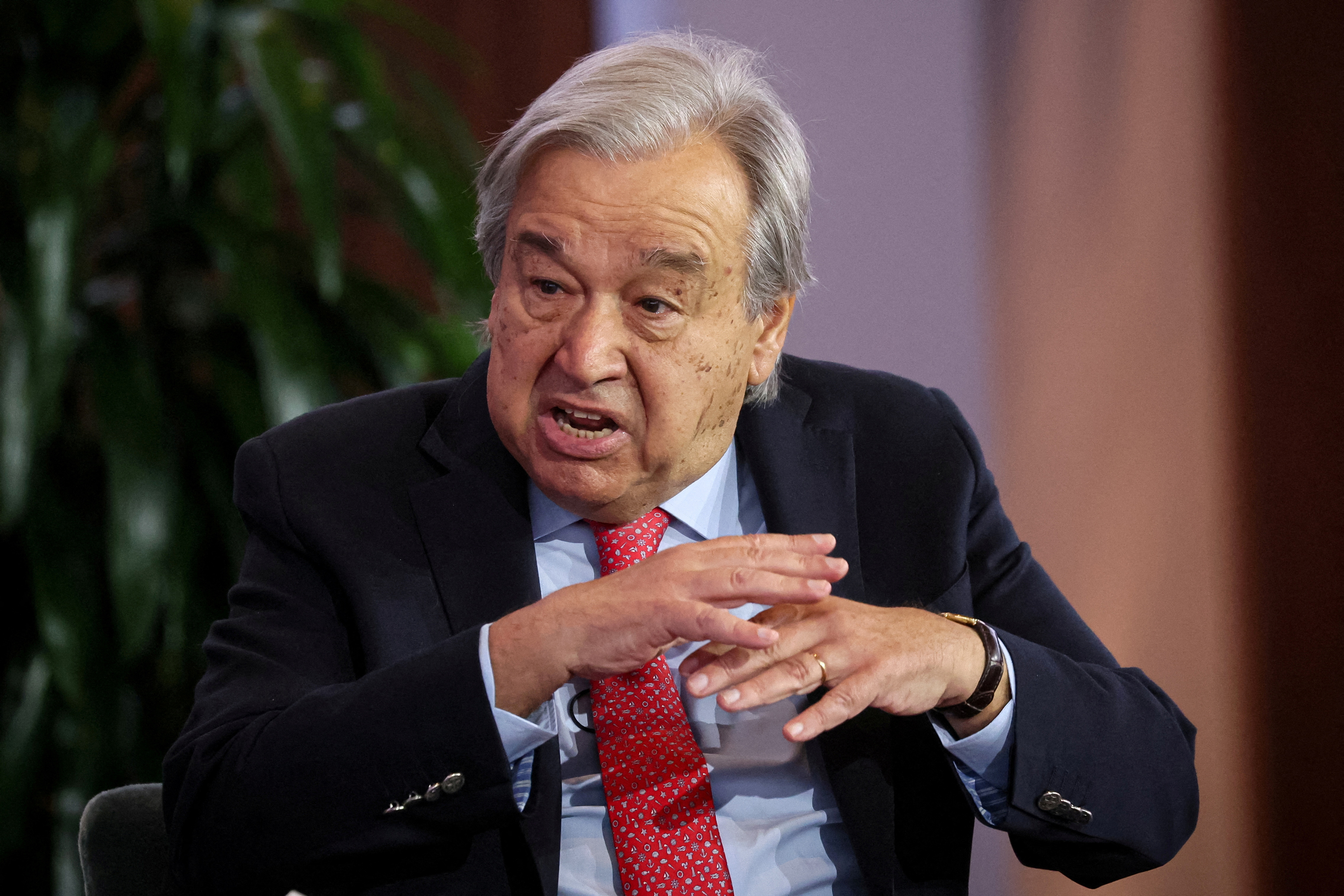
The number of civilian deaths in Gaza during the past month of war between Israel and Hamas means something is "clearly wrong" with Israel's military operation, the United Nations secretary general said Wednesday.
“Nothing should reduce our total rejection for the horrible things that Hamas did” in its October 7 attacks that killed about 1,400 people, Secretary-General António Guterres said in an interview with Reuters . “But we need to distinguish: Hamas is one thing, the Palestinian people (are) another.”
“There are violations by Hamas when they have human shields,” he said. “But when one looks at the number of civilians that were killed with the military operations, there is something that is clearly wrong.”
Israel’s operations must be conducted with full respect to the laws of war, Guterres said, while allowing for humanitarian aid to enter Gaza.
“To a certain extent, the sympathy that is generated in the world is being put into question by the images that every day we have in which we see people in a dramatic humanitarian situation," he said, also calling for the immediate release of all hostages held by Hamas.
Deaths in Gaza: About three-quarters of the 10,515 people killed in Gaza since the conflict began are children, women and the elderly, according to a report Wednesday by the Palestinian Ministry of Health in Ramallah, which draws on sources from the Hamas-controlled enclave. It's unclear how many combatants are included in that total.
Please enable JavaScript for a better experience.

Security Alert May 17, 2024
Worldwide caution, update may 10, 2024, information for u.s. citizens in the middle east.
- Travel Advisories |
- Contact Us |
- MyTravelGov |
Find U.S. Embassies & Consulates
Travel.state.gov, congressional liaison, special issuance agency, u.s. passports, international travel, intercountry adoption, international parental child abduction, records and authentications, popular links, travel advisories, mytravelgov, stay connected, legal resources, legal information, info for u.s. law enforcement, replace or certify documents.
Before You Go
Learn About Your Destination
While Abroad
Emergencies
Share this page:
Travel Advisory July 24, 2023
Malaysia - level 1: exercise normal precautions.
Reissued with obsolete COVID-19 page links removed.
Exercise normal precautions in Malaysia. Some areas have increased risk. Read the entire Travel Advisory.
Exercise Increased Caution in:
- The eastern area of Sabah State due to kidnapping .
Read the country information page for additional information on travel to Malaysia.
If you decide to travel to Malaysia:
- Enroll in the Smart Traveler Enrollment Program ( STEP ) to receive Alerts and make it easier to locate you in an emergency.
- Follow the Department of State on Facebook and Twitter .
- Review the Country Security Report for Malaysia.
- Visit the CDC page for the latest Travel Health Information related to your travel.
- Prepare a contingency plan for emergency situations. Review the Traveler’s Checklist .
Eastern Area of Sabah State – Level 2: Exercise Increased Caution
There is a threat of kidnappings-for-ransom from both terrorist and criminal groups. These groups may attack with little to no warning, targeting coastal resorts, island resorts, and boats ferrying tourists to resort islands.
The U.S. government has limited ability to provide emergency services to U.S. citizens in eastern Sabah as U.S. government employees must obtain special authorization to travel to parts of eastern Sabah.
Embassy Messages
View Alerts and Messages Archive
Quick Facts
Six months beyond date of arrival
At least one blank page required for entry stamp
Not normally required for stays of less than 90 days.
$10,000 or equivalent
Embassies and Consulates
U.S. Embassy Kuala Lumpur
376 Jalan Tun Razak 50400, Kuala Lumpur Malaysia Telephone: +(60) (3) 2168-5000 Emergency After-Hours Telephone: +(60) (3) 2168-5000 (press 0 at the recording) Fax: +(60) (3) 2148-5801 Email: [email protected]
Destination Description
Learn about the U.S. relationship to countries around the world.
Entry, Exit and Visa Requirements
To enter Malaysia, your passport must be valid for at least six months beyond the date of your arrival in Malaysia. You must have at least one blank page for the entry stamp. Permission to enter and remain in Malaysia is under the authority of the Malaysian Immigration Department. Visit the websites of the Embassy of Malaysia in Washington D.C . and the Malaysian Immigration Department for more information.
Effective January 1, 2024, the Malaysian Immigration Department requires all travelers to complete the Malaysian Digital Arrival Card (MDAC) . Permanent residents of Malaysia, long term-pass holders, and diplomatic and official passport holders are exempt from this requirement.
For the latest information, travelers should review the Malaysian Immigration website . You can submit an online inquiry form or contact the Malaysian Government call center (MyGCC) at +60 3-8000-8000. If you are outside of Malaysia, you should contact the nearest Malaysian embassy or consulate if you have questions about Malaysian entry and exit requirements.
If you are planning onward travel after departing Malaysia, please note that many other countries in the region require at least six months’ remaining validity on your passport to enter.
You do not need a visa if you are coming for business or tourism for 90 days or less.
Immigration officials will place an entry stamp, known as a social visit pass (visa), in your passport authorizing a stay of up to 90 days. Travelers may apply to the Malaysian Immigration Department for extensions, which may or may not be granted. You must exit Malaysia using the same passport that you used to enter. If this passport is replaced for any reason before you depart Malaysia, you must apply with Immigration to obtain a “special pass” (exit permit) in your new passport prior to departing.
Neither the U.S. Government nor the U.S. Embassy in Kuala Lumpur can intervene on your behalf when you apply for a Malaysian visa, nor can we advocate for your admission into Malaysia if you are denied entry.
Travel Document : Persons traveling on a USCIS-issued Refugee Travel Document issued by the United States Citizenship and Immigration Services (USCIS) must apply for a visa prior to traveling to Malaysia.
Border Crossings: Follow all entry instructions, present your passports only to immigration officials, and be sure immigration officials stamp your passport with the correct date upon entering and exiting Malaysia. Lack of correct documentation or proof of entry into Malaysia may result in high fines and/or detention.
Sabah and Sarawak: The eastern states of Sabah and Sarawak (on the island of Borneo) maintain semi-autonomous immigration controls and may have additional have special entry requirements. You must have your passport to enter or exit Sabah or Sarawak, even when arriving from peninsular Malaysia on domestic flights.
Dual Nationality: Malaysia does not recognize or permit dual nationality. If Malaysian authorities learn that you are a U.S.-Malaysian dual national, they may require you to immediately forfeit your U.S. passport or your Malaysian citizenship. U.S.-Malaysian dual nationals should consider this issue seriously before traveling to Malaysia. See our dual nationality page for more information.
U.S.-Israeli Dual Nationals: The Malaysian government does not maintain diplomatic relations with Israel, and Immigration officials have denied entry to U.S.-Israeli dual nationals who have presented their Israeli passports to show exit stamps from their last destination point of departure. U.S.-Israeli dual nationals should use their U.S. passports to depart the last country on their itinerary prior to arriving in Malaysia.
Visa Overstays: Malaysian immigration authorities have exit controls at all official ports of departure and routinely fine and detain foreigners who overstay their social visit passes (visas). If you overstay your visa, you will not be allowed to exit Malaysia until you resolve the overstay with the Immigration Department of Malaysia.
Carry your passport (containing the Malaysian entry stamp) with you at all times in case authorities question your immigration status. Several U.S. citizens have been arrested during immigration sweeps based on inability to establish nationality and legal status in Malaysia. Detentions may last from a few hours to several weeks. Check your visa status periodically while in Malaysia and strictly follow immigration laws and regulations.
Visit the Embassy of Malaysia website for the most current visa information.
The U.S. Department of State is unaware of any HIV/AIDS entry restrictions for visitors to or foreign residents of Malaysia.
Find information on prevention of international child abduction and customs regulations on our website.
Safety and Security
Terrorism: Terrorist groups and those inspired by such organizations are intent on attacking U.S. citizens abroad. Terrorists are increasingly using less sophisticated methods of attack – including knives, firearms, and vehicles – to more effectively target crowds. Frequently, their aim is unprotected or vulnerable targets, such as:
- High-profile public events (sporting contests, political rallies, demonstrations, holiday events, celebratory gatherings, etc.)
- Hotels, clubs, and restaurants frequented by tourists
- Places of worship
- Shopping malls and markets
- Public transportation systems (including subways, buses, trains, and scheduled commercial flights)
Malaysia remains a transit point and, to a lesser extent, a destination country for members of terrorist groups including ISIS, Abu Sayyaf Group, al-Qa’ida, and Jemaah Islamiyah. Information from credible sources suggests that there is a continued risk of armed terrorist and criminal groups operating and planning attacks against foreigners, including U.S. citizens, in the East Asian and Pacific region, including Malaysia. Since 2013, Malaysian authorities have arrested more than 500 supporters of ISIS, including many individuals who planned to fight in Syria and Iraq.
Use caution in eastern Sabah because of the threat of kidnappings-for-ransom and violence from both terrorist and criminal groups, including the Philippines-based Abu Sayyaf Group (see the Philippines Travel Advisory for more information ). In addition to targeting coastal or resort islands themselves, criminal or terrorist groups may attempt to intercept boats ferrying tourists from the mainland to resort islands.
Due to safety concerns, U.S. government employees traveling for both personal and official travel to Sabah east of the north-south line drawn from the cities of Kudat to Tawau, including all islands, must obtain official written permission from the U.S. Embassy in Kuala Lumpur. The exceptions are the cities of Sandakan, Lahad Datu, Tawau, the Sepiloolik Nature Reserve, and the Kinabatangan River areas, which require U.S. government employees to officially notify the Embassy prior to travel.
Malaysian law enforcement officials have enacted land and water-based curfews in the coastal areas of eastern Sabah. Check local media or ask local police for the most recent curfew information if traveling to eastern Sabah.
For more information, see our Terrorism page.
Crime: Petty theft and violent crime in Kuala Lumpur continue to be concerns. Purse snatchings, pickpocketing, smash-and-grab thefts from vehicles, and residential burglaries are the most common crimes committed against both locals and foreigners. Avoid wrapping purse straps around arms or shoulders to avoid injury. Violent and more serious crimes are less common; however, in October 2022, following local media reports of an increase in violent crime in the area of 430-440 Jalan Tun Razak, which houses multiple bars, clubs, and restaurants, the Embassy has advised U.S. government employees visiting establishments in this general vicinity to depart the neighborhood no later than 9:00 pm.
Taxi drivers in central Kuala Lumpur have perpetrated violent crimes against foreign tourists and local residents. Use e-hailing services or book taxis in downtown shopping areas by phone or online, rather than hailing a taxi on the street, particularly after dark.
Criminals also target motorists stuck in traffic or stopped at a light with smash and grab robberies. Keep valuables out of sight while driving or remove them from the car (including from the trunk) when parked. GPS devices should not be left on the windshield or dashboard.
Demonstrations occur frequently. They may take place in response to political or economic issues, on politically significant holidays, and during international events.
- Demonstrations can be unpredictable, avoid areas around protests and demonstrations.
- Check local media for updates and traffic advisories.
Local law pertaining to peaceful assembly prohibits non-Malaysians from participating in public protests.
International Financial Scams: See the Department of State and the FBI pages for information.
Sophisticated internet romance and financial scams are prevalent in Malaysia. Scams are often initiated through Internet postings/profiles or, less frequently, by unsolicited emails, letters, text messages, and messages on social media. Scammers frequently pose as U.S. citizens who have no one else to turn to for help. Common scams include:
- Romance/Online dating
- Money transfers
- Lucrative sales
- Gold purchase
- Contracts with promises of large commissions
- Inheritance notices
- Work permits/job offers
- Bank overpayments
Victims of Crime: U.S. citizen victims of sexual assault are encouraged to contact the U.S. Embassy for assistance. Report crimes to the local police via the emergency line at 999 (landline) or 112 (cell/mobile). Alternatively, call the Royal Malaysia Police (RMP) Operations Center in Kuala Lumpur, 03-2115-9999 or 03-2266-2222 for advice on how to make a non-emergency police report. Contact the U.S. Embassy at +(60) (3) 2168-5000 for assistance. A police report is necessary for the Embassy to help victims follow up on incidents of crime. In some tourist areas, the police have established small "Tourist Police” stations manned by personnel familiar with helping visitors to Malaysia. Remember that local authorities are responsible for investigating and prosecuting a crime.
See our webpage on help for U.S. victims of crime overseas .
- Help you find appropriate medical care
- Assist you in reporting a crime to the police
- Contact relatives or friends with your written consent
- Provide general information regarding the victim’s role during the local investigation and following its conclusion
- Provide a list of local attorneys
- Provide our information on victim’s compensation programs in the U.S.
- Provide an emergency loan for repatriation to the United States and/or limited medical support in cases of destitution
- Help you find accommodation and arrange flights home
- Replace a stolen or lost passport
Domestic Violence: U.S. citizen victims of domestic violence are encouraged to contact the Embassy at +(60) (3) 2168-5000 for assistance. Victims of domestic violence, sexual assault, and child abuse may receive comprehensive care at the One Stop Crisis Centers (OSCC) located in all government hospitals. The OSCC provide survivors medical care, temporary shelter, legal aid, and counseling.
Tourism: The tourism industry is generally regulated and rules with regard to best practices and safety inspections are regularly enforced. Hazardous areas/activities are identified with appropriate signage and professional staff is typically on hand in support of organized activities. In the event of an injury, appropriate medical treatment is widely available throughout the country. Outside of a major metropolitan center, it may take more time for first responders and medical professionals to stabilize a patient and provide life-saving assistance, and first responder capabilities may vary. When participating in trekking or other activities in extremely remote areas, particularly in the eastern states of Sabah and Sarawak on the island of Borneo, it may be difficult for first responders to reach patients quickly.
U.S. citizens are encouraged to purchase medical evacuation insurance. See our webpage for more information on insurance providers for overseas coverage.
Local Laws & Special Circumstances
Criminal Penalties: You are subject to local laws. If you violate local laws, even unknowingly, you may be expelled, arrested, or imprisoned. Individuals establishing a business or practicing a profession that requires additional permits or licensing should seek information from the competent local authorities, prior to practicing or operating a business.
Penalties for using, possessing, or trafficking in illegal drugs in Malaysia are more severe than those in the United States, and convicted offenders can expect long jail sentences and heavy fines, or death.
It is illegal to take pictures of certain buildings such as military facilities, government buildings and offices, and Ministry of Health facilities including public hospitals and clinics.
Driving under the influence could land you immediately in jail.
Certain white-collar crimes are punishable by caning.
If you purchase or collect local plants or wildlife without authorization from the Malaysian government, you may be prosecuted and sentenced to heavy fines, expulsion and/or imprisonment.
It is illegal to distribute religious literature of another faith to Malaysian Muslims. Special religious authorities and local police occasionally conduct raids on popular nightspots and hotels to deter activities among local Muslims that contravene religious customs, including drinking alcohol and adultery.
Furthermore, some laws are also prosecutable in the United States, regardless of local law. For examples, see our website on crimes against minors abroad and the Department of Justice website.
Arrest Notification: If you are arrested or detained, ask the police or prison officials to notify the U.S. Embassy immediately. See our webpage for further information.
Counterfeit and Pirated Goods: Although counterfeit and pirated goods are prevalent in many countries, they may still be illegal according to local laws. You may also pay fines or have to give them up if you bring them back to the United States. See the U.S. Department of Justice website for more information.
Currency: Currency exchange and Western Union money transfers are readily available. Credit cards are accepted throughout the country, but you should be aware of the risk of fraud. If possible, ensure your credit card remains in your presence during every transaction. ATMs can be a safer means of obtaining Malaysian Ringgit. PINs in Malaysia are six digits long, and some travelers have reported having difficulty retrieving cash from ATMs using four-digit PINs.
Faith-Based Travelers: See the following webpages for details:
Faith-Based Travel Information
International Religious Freedom Report – see country reports
Human Rights Report – see country reports
Hajj Fact Sheet for Travelers
Best Practices for Volunteering Abroad
LGBTQI+ Travelers: Malaysia’s penal code criminalizes homosexual acts, termed “carnal intercourse against the order of nature,” leading to punishment of up to 20 years in prison and/or whipping, and police periodically raid LGBTQI+ frequented nightclubs and events. Foreign same-sex marriages or civil unions are not recognized as legally valid. Several states in Malaysia have instated Islamic Sharia laws, applying to male and female Muslims, criminalizing same-sex activity with up to three years imprisonment and whipping. Transgender individuals have been arrested and charged with "indecent behavior,” and received fines and prison sentences of up to three months. Transgender individuals may also be denied entry to Malaysia at the discretion of the Malaysian immigration authorities. LGBTQI+ individuals may face discrimination or even violence, especially in more conservative rural areas. See LGBTQI+ Travel Information page and section 6 of our Human Rights Report for further details.
Travelers With Disabilities: The law in Malaysia prohibits discrimination against persons with physical, sensory, intellectual or mental disabilities, but the law is not regularly enforced. Social acceptance of persons with disabilities in public is as prevalent as in the United States. The most common types of accessibility may include accessible government facilities, information, and communication/access to services. Expect accessibility to be limited in public transportation, older lodging, and older public infrastructure, and common in newer lodging, communication/information, and newer public infrastructure. Accessibility is more limited in rural areas.
Malaysia has an active civil society and NGO community focused on disability welfare and protection. They are usually able to provide information and assistance in employment services, assistive devices and equipment, chore services, companion-based services, day services, and support network for parents.
See our Travelers with Disabilities page.
Students: See our Students Abroad page and FBI travel tips .
Women Travelers: In cases of sexual assault, victims should go directly to the nearest major public hospital which will offer “one-stop” response including medical care and testing, forensic testing, access to the police to make a criminal report, legal assistance, counseling, and temporary shelter. See our travel tips for Women Travelers .
For emergency services in Malaysia, dial 999 (landline) or 112 (cell/mobile). Callers to 999 emergency number are directed to whichever government hospital the dispatcher chooses.
Ambulance services are:
- Widely available but training and availability of emergency responders may be below U.S. standards.
- Not equipped with state-of-the-art medical equipment.
- Injured or seriously ill travelers may prefer to take a taxi or private vehicle to the nearest major hospital rather than wait for an ambulance (45+min).
We do not pay medical bills. Be aware that U.S. Medicare/Medicaid does not apply overseas. Most hospitals and doctors overseas do not accept U.S. health insurance. Malaysian hospitals will not bill your insurance directly. You must provide payment and seek reimbursement.
Medical Insurance: Make sure your health insurance plan provides coverage overseas. Most care providers overseas only accept cash payments. See our webpage for more information on insurance providers for overseas coverage. Visit the U.S. Centers for Disease Control and Prevention for more information on type of insurance you should consider before you travel overseas.
We strongly recommend supplemental MEDEVAC insurance to cover medical evacuation.
Always carry your prescription medication in original packaging with your doctor’s prescription. Check with the Royal Malaysian Customs Department to ensure the medication is legal in Malaysia.
Vaccinations: Be up-to-date on all vaccinations recommended by the U.S. Centers for Disease Control and Prevention (CDC).
Further health information:
- World Health Organization
- U.S. Centers for Disease Control and Prevention (CDC)
Air Quality: Visit AirNow Department of State for information on air quality at U.S. Embassies and Consulates.
The air quality varies considerably and fluctuates with the seasons. It is typically at its worst in the dry season from July to October due to large agricultural fires in the region. People at the greatest risk from particle pollution exposure include:
- Infants, children, and teens
- People over 65 years of age
- People with lung disease such as asthma and chronic obstructive pulmonary disease (COPD), which includes chronic bronchitis and emphysema;
- People with heart disease or diabetes
- People who work or are active outdoors
The U.S. Embassy maintains a list of doctors and hospitals . We do not endorse or recommend any specific medical provider or clinic.
Medical Facilities and Services:
- Adequate health facilities are available throughout the country but health care in rural areas may be below U.S. standards.
- Private hospitals usually require advance payment before admitting a patient.
- Medical staff in rural areas may speak little English.
- Generally, in public hospitals only minimal staff is available overnight in non-emergency wards. Consider hiring a private nurse or having family spend the night with the patient, especially a minor child.
- Psychological and psychiatric services are limited, even in the larger cities, with hospital-based care typically only available through government institutions.
Medical Tourism and Elective Surgery
- Medical tourism is a rapidly growing industry. People seeking health care overseas should understand that medical systems operate differently from those in the United States and are not subject to the same rules and regulations. Anyone interested in traveling for medical purposes should consult with their local physician before traveling and visit the U.S. Centers for Disease Control and Prevention website for more information on Medical Tourism.
- Visit the U.S. Centers for Disease Control and Prevention website for information on Medical Tourism, the risks of medical tourism, and what you can do to prepare before traveling to Malaysia.
- We strongly recommend supplemental MEDEVAC insurance to cover medical evacuation in the event of unforeseen medical complications.
- Your legal options in case of malpractice are very limited in Malaysia.
- Although Malaysia has many elective/cosmetic surgery facilities that are on par with those found in the United States, the quality of care varies widely. If you plan to undergo surgery in Malaysia, make sure that emergency medical facilities are available and professionals are accredited and qualified.
Pharmaceuticals
- Exercise caution when purchasing medication overseas. Pharmaceuticals, both over the counter and requiring prescription in the United States, are often readily available for purchase with little controls. Counterfeit medication is common and may prove to be ineffective, the wrong strength, or contain dangerous ingredients. Medication should be purchased in consultation with a medical professional and from reputable establishments.
- U.S. Customs and Border Protection and the Food and Drug Administration are responsible for rules governing the transport of medication back to the United States. Medication purchased abroad must meet their requirements to be legally brought back into the United States. Medication should be for personal use and must be approved for usage in the United States. Please visit the U.S. Customs and Border Protection and the Food and Drug Administration websites for more information.
Assisted Reproductive Technology and Surrogacy
- If you are considering traveling to Malaysia to have a child through use of assisted reproductive technology (ART) or surrogacy, please see our ART and Surrogacy Abroad page .
- Although surrogacy agencies/clinics claim surrogacy is legal in Malaysia, there is no legal framework for foreigners or same-sex couples to pursue surrogacy in Malaysia. As a result, surrogacy agreements between foreign or same-sex intending parents and gestational mothers are not enforced by Malaysia courts.
- If you decide to pursue parenthood in Malaysia via assisted reproductive technology (ART) with a gestational mother, be prepared for long and unexpected delays in documenting your child’s citizenship. Be aware that individuals who attempt to circumvent local law risk criminal prosecution.
Water Quality
- In many areas, tap water is not potable. Bottled water and beverages are generally safe, although you should be aware that many restaurants and hotels serve tap water unless bottled water is specifically requested. Be aware that ice for drinks may be made using tap water.
Adventure Travel
- Visit the U.S. Centers for Disease Control and Prevention website for more information about Adventure Travel .
General Health Language
The following diseases are prevalent:
- Chikungunya
- Leptospirosis
- Use the U.S. Centers for Disease Control and Prevention recommended mosquito repellents and sleep under insecticide-impregnated mosquito nets. Chemoprophylaxis is recommended for all travelers even for short stays.
- Visit the U.S. Centers for Disease Control and Prevention website for more information about Resources for Travelers regarding specific issues in Malaysia.
Travel and Transportation
Road Conditions and Safety: Road safety is a very serious safety concern. Prior to the COVID-19 pandemic, Malaysia averagesd approximately 2219 traffic fatalities a day, placing it among the top 1020 most dangerous countries in which to operate a vehicle worldwide. Undisciplined motorcycle and motor scooter operators are the principal cause of traffic accidents and constitute nearly two-thirds of all traffic fatalities. Motorcyclists tend not to obey traffic laws and often travel without regard for their safety or that of other motorists. As such, use turn signals well in advance of turning to alert motorcycles.
Bottlenecks are common in major cities because road building has not kept pace with the spread of motorized vehicles. Multi-lane highways often merge into narrow two-lane roads in the center of town and cause congestion. Many streets are narrow and winding. Traffic is heavy during the morning and afternoon rush hours and slows down considerably when it rains. Monsoonal rains can quickly flood roads located in low-lying areas.
Traffic Laws: Traffic in Malaysia moves on the left side of the road, and most vehicles are right-hand drive. By law, you must use your front and back seat belts and must not use your cell phone while driving unless it is hands-free (e.g., Bluetooth). Turning left at a red light is not legal unless otherwise marked. Carry your passport or Malaysian identification card at all times when driving.
If you are involved in a traffic accident:
- Call the police immediately. Depending on the severity of the accident, you should call either the emergency number 999 (or 112 from a mobile phone) or the Royal Malaysia Police Operations Center in Kuala Lumpur, 03-2115-9999 or 03-2266-2222.
- Stay in your car and wait for the police to arrive before exchanging information with other parties involved in the accident.
Reports of road rage incidents, especially after midnight, are rising. Avoid confrontational behavior if you are involved in an accident. If you are threatened, stay in your car and lock the doors. If able, lleave the scene and file a report with the local police within 24 hours.
Sobriety Checkpoints: Laws against drinking and driving are strictly enforced and carry serious penalties. Police operate sobriety checkpoints in many entertainment districts frequented by expatriates. At these checkpoints, all drivers must submit to alcohol breath tests. If you fail a breath test, you will be arrested.
Driver’s License Requirements: International Driving Permits (IDP) may be used in conjunction with a valid U.S. license. The IDP must be obtained outside of Malaysia. If your IDP or U.S. license has expired, you will need to obtain a local driver’s license. Some classifications of visa holders may also be eligible for driver’s license “conversion,” a quicker process to obtain a local license. For additional information on this process, please contact the Malaysian Ministry of Transportation directly. The Ministry of Transportation recommends contacting a local driving school to arrange the paperwork. In order to obtain a local license, you will also need a valid long-term visa or work permit.
Many car rental agencies in Malaysia are willing to rent vehicles for a short term to U.S. citizens with valid U.S. driver’s licenses. Nevertheless, if you plan to drive in Malaysia, obtain an IDP before leaving the United States. More information on how to obtain an IDP is available on the Driving Abroad section of the Department of State website.
Public Transportation: There have been fatal and other serious accidents involving long-distance tour buses in Malaysia, particularly at night or in adverse weather conditions. If you plan to travel by bus, choose a reputable company, and avoid overnight routes.
Taxis are metered, but many drivers refuse to use the meter and instead charge a much higher rate, particularly during peak hours, when it is raining or when the passenger’s destination is to or through a heavily congested area. By regulation, metered fares increase by 50 percent between midnight and 6:00 a.m.; meters are programmed to display the higher fee automatically during these hours. Many individuals prefer to book taxi and car services through widely-used smart phone apps both for convenience and fare transparency.
See our Road Safety page for more information.
Aviation Safety Oversight: The U.S. Federal Aviation Administration (FAA) has assessed the government of Malaysia’s Civil Aviation Authority as not being in compliance with International Civil Aviation Organization (ICAO) aviation safety standards for oversight of Malaysia’s air carrier operations. Further information may be found on the FAA’s safety assessment page .
Maritime Travel: Mariners planning travel to Malaysia should also check for U.S. maritime advisories and alerts . Information may also be posted to the U.S. Coast Guard homeport website , and the NGA broadcast warnings .
For additional travel information
- Enroll in the Smart Traveler Enrollment Program (STEP) to receive security messages and make it easier to locate you in an emergency.
- Call us in Washington, D.C. at 1-888-407-4747 (toll-free in the United States and Canada) or 1-202-501-4444 (from all other countries) from 8:00 a.m. to 8:00 p.m., Eastern Standard Time, Monday through Friday (except U.S. federal holidays).
- See the State Department’s travel website for the Worldwide Caution and Travel Advisories .
- Follow us on Twitter and Facebook .
- See traveling safely abroad for useful travel tips.
Review information about Review information about International Parental Child Abduction in Malaysia . For additional IPCA-related information, please see the International Child Abduction Prevention and Return Act ( ICAPRA ) report.
Travel Advisory Levels
Assistance for u.s. citizens, malaysia map, learn about your destination, enroll in step.

Subscribe to get up-to-date safety and security information and help us reach you in an emergency abroad.
Recommended Web Browsers: Microsoft Edge or Google Chrome.
Check passport expiration dates carefully for all travelers! Children’s passports are issued for 5 years, adult passports for 10 years.
Afghanistan
Antigua and Barbuda
Bonaire, Sint Eustatius, and Saba
Bosnia and Herzegovina
British Virgin Islands
Burkina Faso
Burma (Myanmar)
Cayman Islands
Central African Republic
Cote d Ivoire
Curaçao
Czech Republic
Democratic Republic of the Congo
Dominican Republic
El Salvador
Equatorial Guinea
Eswatini (Swaziland)
Falkland Islands
France (includes Monaco)
French Guiana
French Polynesia
French West Indies
Guadeloupe, Martinique, Saint Martin, and Saint Barthélemy (French West Indies)
Guinea-Bissau
Isle of Man
Israel, The West Bank and Gaza
Liechtenstein
Marshall Islands
Netherlands
New Caledonia
New Zealand
North Korea (Democratic People's Republic of Korea)
Papua New Guinea
Philippines
Republic of North Macedonia
Republic of the Congo
Saint Kitts and Nevis
Saint Lucia
Saint Vincent and the Grenadines
Sao Tome and Principe
Saudi Arabia
Sierra Leone
Sint Maarten
Solomon Islands
South Africa
South Korea
South Sudan
Switzerland
The Bahamas
Timor-Leste
Trinidad and Tobago
Turkmenistan
Turks and Caicos Islands
United Arab Emirates
United Kingdom
Vatican City (Holy See)
External Link
You are about to leave travel.state.gov for an external website that is not maintained by the U.S. Department of State.
Links to external websites are provided as a convenience and should not be construed as an endorsement by the U.S. Department of State of the views or products contained therein. If you wish to remain on travel.state.gov, click the "cancel" message.
You are about to visit:

Travel Guide
- Things to Do
- Entry Requirements & Customs
- Getting Around
- Regions in Brief
- Tips on Accommodations
- Calendar of Events
- Sustainable Travel & Ecotourism
- Getting There
- Health & Safety
- Escorted & Package Tours
- Tips for Gay and Lesbian Travelers
- Tips for Senior Travelers
- Tips for Travelers with Disabilities
- Tips for Women Travelers
- Tips for Jewish Travelers
- Staying Connected
- Suggested Itineraries
Tips for Jewish Travelers in Malaysia
Jewish travelers, take note: Travelers with Israeli passports are not permitted to enter Malaysia. If you are of Jewish heritage and carry a passport from a country other than Israel, I recommend you downplay your heritage. Malaysian politicians have been known to make anti-Semitic comments in public, sentiments that, unfortunately, carry over into some sections of the general population.
Note : This information was accurate when it was published, but can change without notice. Please be sure to confirm all rates and details directly with the companies in question before planning your trip.

- All Regions
- Australia & South Pacific
- Caribbean & Atlantic
- Central & South America
- Middle East & Africa
- North America
- Washington, D.C.
- San Francisco
- New York City
- Los Angeles
- Arts & Culture
- Beach & Water Sports
- Local Experiences
- Food & Drink
- Outdoor & Adventure
- National Parks
- Winter Sports
- Travelers with Disabilities
- Family & Kids
- All Slideshows
- Hotel Deals
- Car Rentals
- Flight Alerts
- Credit Cards & Loyalty Points
- Cruise News
- Entry Requirements & Customs
- Car, Bus, Rail News
- Money & Fees
- Health, Insurance, Security
- Packing & Luggage
- -Arthur Frommer Online
- -Passportable
- Road Trip Guides
- Alaska Made Easy
- Great Vacation Ideas in the U.S.A.
- Best of the Caribbean
- Best of Mexico
- Cruise Inspiration
- Best Places to Go 2024

- The Star ePaper
- Subscriptions
- Manage Profile
- Change Password
- Manage Logins
- Manage Subscription
- Transaction History
- Manage Billing Info
- Manage For You
- Manage Bookmarks
- Package & Pricing
PM Anwar urges caution on calls for Malaysia’s withdrawal from US-led maritime exercise
Friday, 31 May 2024
Related News

Anwar emphasises unity at Kaamatan celebration in Sabah
Pm anwar arrives in labuan for half-day working visit, be vigilant against forces undermining unity, says anwar.
LABUAN: Malaysia must adopt a rational approach in responding to calls from non-governmental organisations (NGOs) to withdraw from a US-led maritime military exercise that includes the participation of the Israeli army.
Prime Minister Datuk Seri Anwar Ibrahim emphasised the need for thorough consideration of the matter and its potential implications.
"Our stance is firm; no country is as vocal as Malaysia on the Israel issue... we protest every day. We must act carefully and not be driven by anger or sentiment.
"Even during the previous Perikatan Nasional government, an Israeli ship docked at our port.
"When we took over the government, we were the ones who stopped the Israeli ship from anchoring, despite facing criticism," Anwar told reporters after visiting the Labuan Roll-on Roll-off Ferry Terminal on Friday (May 31).
Anwar stressed that the government’s actions should not compromise the interests of the people and trade.
"If we were to follow the suggested approaches, we would need to halt the operations of companies like Microsoft, Google, Apple, and Facebook," he said.
"Malaysia will continue to voice out against the cruelty faced by the Palestinian people," he added.
On May 30, 15 groups led by the Malaysian chapter of the global anti-Israel movement Boycott, Divestment, Sanctions (BDS Malaysia) issued a joint statement demanding Malaysia’s immediate withdrawal from the Rim of the Pacific Exercise (Rimpac), scheduled to take place from June 26 to Aug 2. – Bernama
Related stories:
Tags / Keywords: Anwar Ibrahim , Malaysia , Maritime Military Exercise , US-led , Israel , BDS Malaysia , Rimpac , Palestinian Support , Rational Approach
Found a mistake in this article?
Report it to us.
Thank you for your report!

Global trading platform Webull expands to Malaysia
Next in nation.

Trending in News
Air pollutant index, highest api readings, select state and location to view the latest api reading.
- Select Location
Source: Department of Environment, Malaysia
Others Also Read
Best viewed on Chrome browsers.

We would love to keep you posted on the latest promotion. Kindly fill the form below
Thank you for downloading.
We hope you enjoy this feature!

IMAGES
VIDEO
COMMENTS
As an Israeli citizen, you are not allowed to enter Malaysia using your Israeli passport, but in case you hold a foreign one you can use it to visit the beautiful country. In doing so, it is important to follow some recommendations: First, do not mention at the border that you have an Israeli passport. Also, avoid showing them your Israeli ...
Visa is not required for a stay of less than one (1) month for ASEAN nationals except Myanmar. Visas are required for duration of stay exceeds (1) month except for Brunei and Singapore nationals. Travel documents that require a visa to enter Malaysia are as follows: Yellow Fever certificate is required to be produced upon landing in Malaysia ...
Israel-Malaysia relations refers to the commercial and cultural ties between Israel and Malaysia. The two countries currently maintain no formal diplomatic relations. ... The visit of Israeli president Chaim Herzog to Singapore in 1986 also sparked fierce criticism by Malaysia. There were even calls to cut off Singapore's water supply and ...
Malaysia is a "very tough nut to crack," and the Southeast Asian Muslim-majority country is "not on its way to establishing ties with Israel," said David Roet, the first Israeli diplomat ...
Up to 3 pieces of new clothing and 1 new pair of footwear. 1 personal electronic per traveller. Food products up to RM75 in value. Other goods, including gifts and souvenirs up to a value of RM400. Goods from Langkawi, Pulau, Tioman or Labuan may be up to a value of RM500. Find more information on the customs regulations of Malaysia page.
Malaysia's government announced Wednesday it was imposing a ban on all Israeli owned and flagged ships, as well as any vessels headed to Israel, from docking at its ports.
An Emirates flight from Dubai to Singapore with 12 Israelis on board was forced to land in Malaysia Wednesday morning due to bad weather, the Foreign Ministry revealed. ... Malaysia and Israel do ...
News from Israel, the Middle East and the Jewish World. ... Israel-Malaysia relations. Advertisement. May 16, 2024, 8:33 am ... 2018 saw record number of tourists visit Israel from Muslim countries .
KUALA LUMPUR: Up to 105 Israeli citizens were permitted entry to Malaysia between 2016 and March this year, Home Affairs Deputy Minister Datuk Mohd Azis Jamman said on Thursday. He revealed that the Israelis were allowed entry after the ministry concluded that their visit here would be beneficial to Malaysia's economy, technological ...
A delegation of Israeli diplomats recently made a visit to Malaysia that marked the first of its kind, to attend a United Nations conference this past week. This is according to Israeli media, who ...
In normal circumstances, nationals of most countries in Europe, the US, Canada, Australia, New Zealand, Japan (and many other countries) can visit Malaysia without a visa for a stay of up to 90 days. This applies to entries by air, land and sea. In practice, 90-day stays are usually given as the default if you arrive in Malaysia by air, but if ...
Aiman Zarul is a visiting student at Columbia University, New York. He was previously with the political section at the European Union Delegation in Malaysia, and is a founder of the Caucus for the Improvement of Malaysia-Israel Relations that advocates culturo-religious cooperation between Muslims and Jews through Malaysia-Israel engagement in economics, politics and social interaction.
Malaysian Prime Minister Anwar Ibrahim speaks during a news conference in Putrajaya, Malaysia on November 5. Fazry Ismail/AFP/Getty Images. Malaysia will maintain ties with Hamas and will not ...
Enroll in the Smart Traveler Enrollment Program (STEP) to receive security messages and make it easier to locate you in an emergency. Call us in Washington, D.C. at 1-888-407-4747 (toll-free in the United States and Canada) or 1-202-501-4444 (from all other countries) from 8:00 a.m. to 8:00 p.m., Eastern Standard Time, Monday through Friday ...
Wednesday, 19 Oct 2022 5:17 PM MYT. KUALA LUMPUR, Oct 19 — Popular Israeli vlogger Nas Daily entered and left Malaysia legally, Immigration director-general Datuk Seri Khairul Dzaimee Daud clarified today. The vlogger whose real name is Nuseir Yassin caused a stir when he was spotted in Melaka on Sunday, but the Immigration chief told Utusan ...
Muslim Malaysia rejects criticism over Israeli visit. Decision to allow a high-level delegation from Jerusalem to attend a UN conference in Kuala Lumpur sparked widespread anger. Protesters wave ...
Growing recognition of Israel has therefore served only to further widen the disparity between Israel and Palestine. Malaysia and Indonesia must buck the trend. There are now only six countries in ...
SEREMBAN: An Israeli citizen entered Malaysia using a Saint Kitts and Nevis passport on Oct 15, says Immigration Department director-general Datuk Seri Khairul Dzaimee Daud.
While planning your visit to Malaysia as an Israel citizen, you might be curious about other visa types and requirements. If you're considering exploring Malaysia beyond the usual tourist spots, our comprehensive guide on Malaysia's Tourist Visa offers deeper insights and broader options for travelers of different nationalities.
Jewish travelers, take note: Travelers with Israeli passports are not permitted to enter Malaysia. If you are of Jewish heritage and carry a passport from a country other than Israel, I recommend you downplay your heritage. Malaysian politicians have been known to make anti-Semitic comments in public, sentiments that, unfortunately, carry over ...
Cash limit. Funds of ₪50,000 Israeli New Shekels (ILS) or higher must be reported. If entering Israel from Gaza, funds of ₪12,000 Israeli New Shekels (ILS) or higher must be reported. If entering Israel from the land borders of Egypt or Jordan, funds of ₪12,000 Israeli New Shekels (ILS) or higher must be reported.
On May 30, 15 groups led by the Malaysian chapter of the global anti-Israel movement Boycott, Divestment, Sanctions (BDS Malaysia) issued a joint statement demanding Malaysia's immediate ...
The ministry, also known as Wisma Putra, said the Israeli regime's relentless, merciless and deliberate genocidal actions against the Palestinian people violated the ruling by the International Court of Justice (ICJ) on May 24, 2024, which demanded an immediate end to Israel's military offensive in Rafah.
In 2009, the Malaysian government banned trips to Israel as the Israel-Palestine conflict worsened. The ban was later lifted in 2011 and in 2012, the stays were extended to 21 days. If you are thinking of visiting Israel, what do you need to know? Well, first of all, you cannot travel to Israel via private means.
Israel must comply with International Court of Justice order calling it to immediately halt military operations in Rafah. Responding to the International Court of Justice's ruling today, which ordered Israel to immediately halt military operations in the governorate of Rafah, following South Africa's application for additional provisional measures in its genocide case, Heba Morayef ...
A police forensic member takes a picture outside a police station in Ulu Tiram, Johor state, Malaysia, that was stormed by a man on Friday, May 17, 2024. Credit: AP Photo. In recent history ...